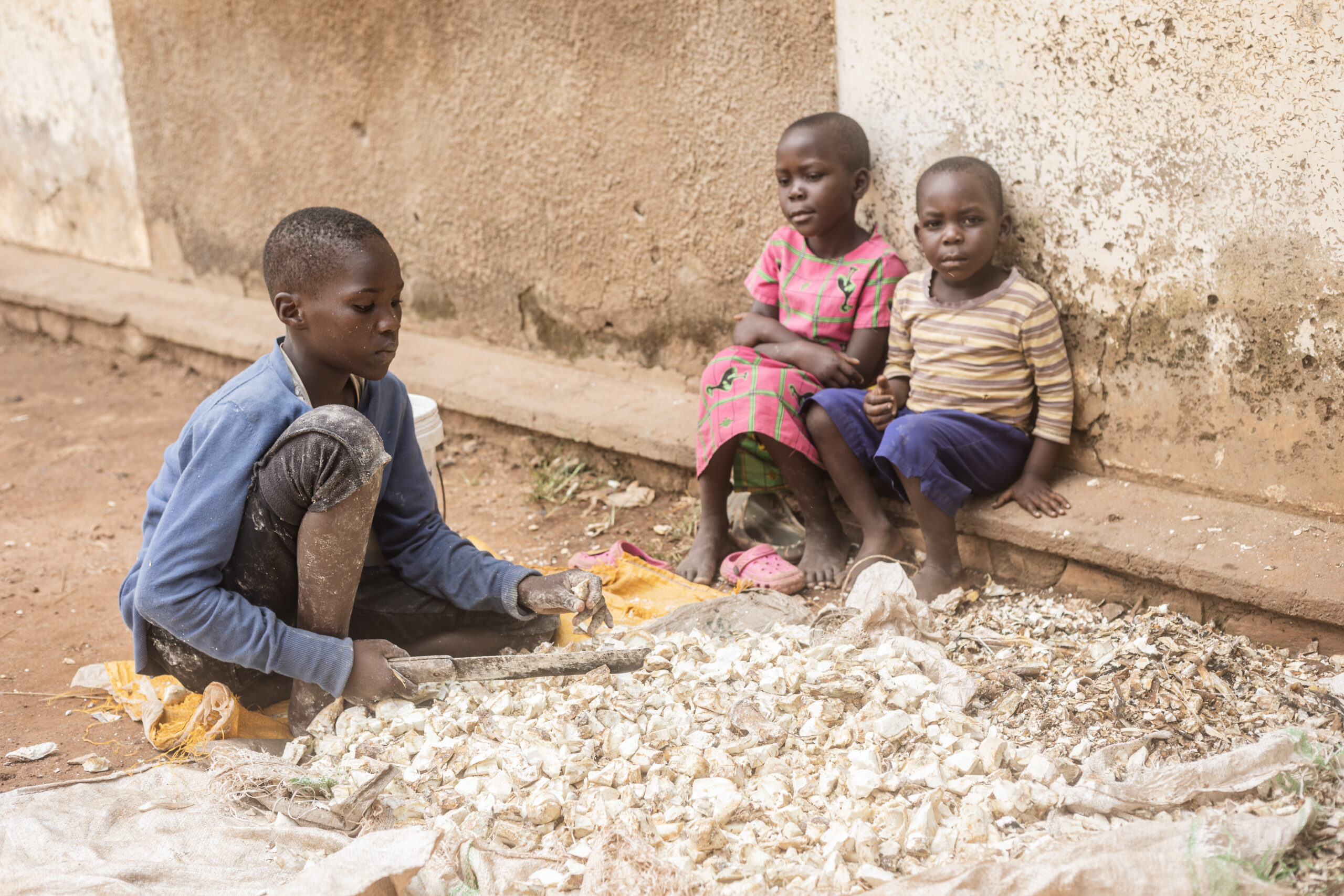
In recent years, Uganda has experienced a significant surge in child labor, rising from 14% in 2016/17 to 39.5% equivalent to 6.2 million children in 2021 (UBOS, 2021). This figure excludes children involved in ousehold chores. This increase has occurred despite numerous policy interventions and the…
Read More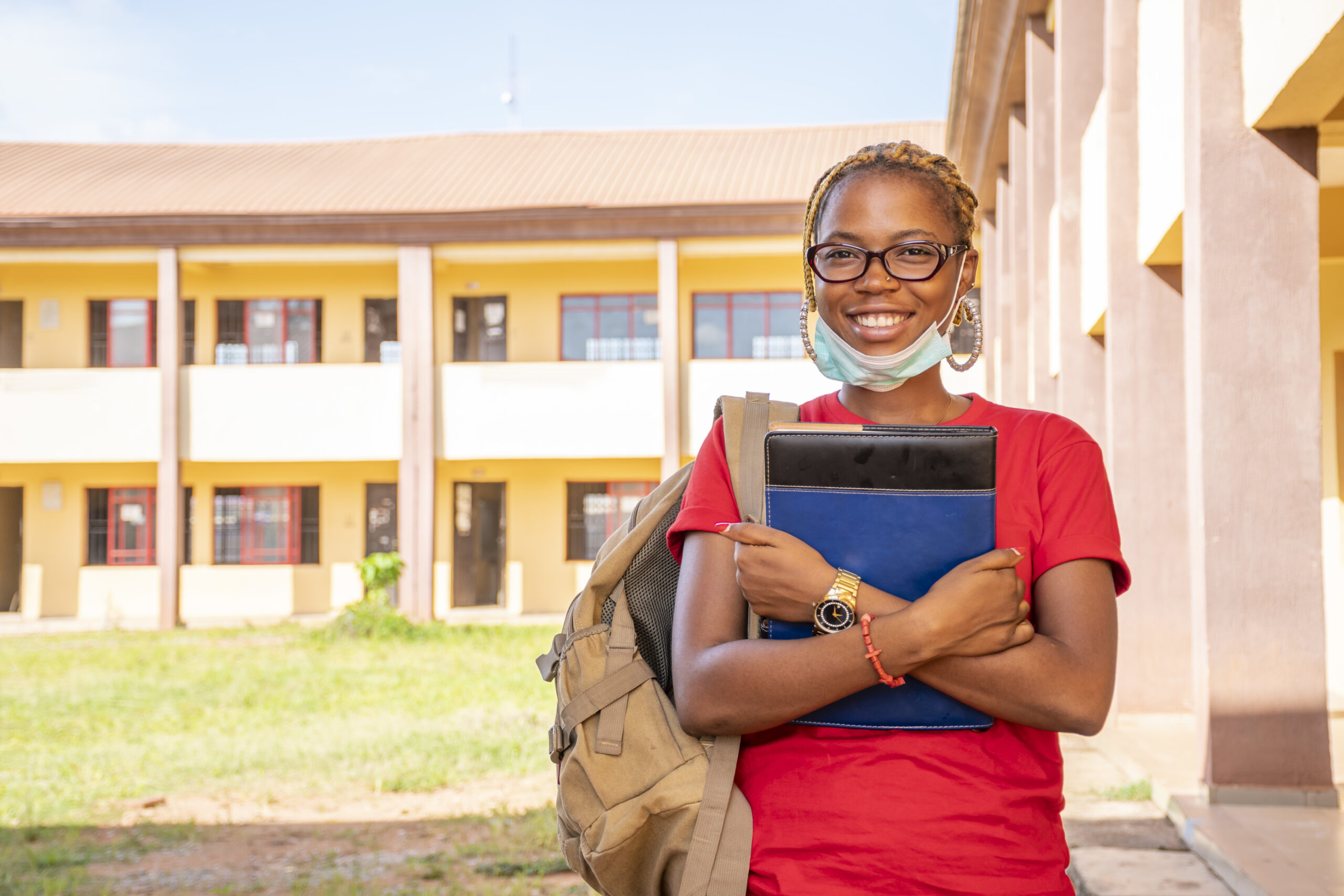
In many parts of Western Uganda, poor school infrastructure has emerged as a silent but powerful driver of student dropouts, particularly in underserved and refugee-hosting communities. Crumbling classrooms, overcrowded learning spaces, lack of clean water and sanitation, and long distances to the n…
Read More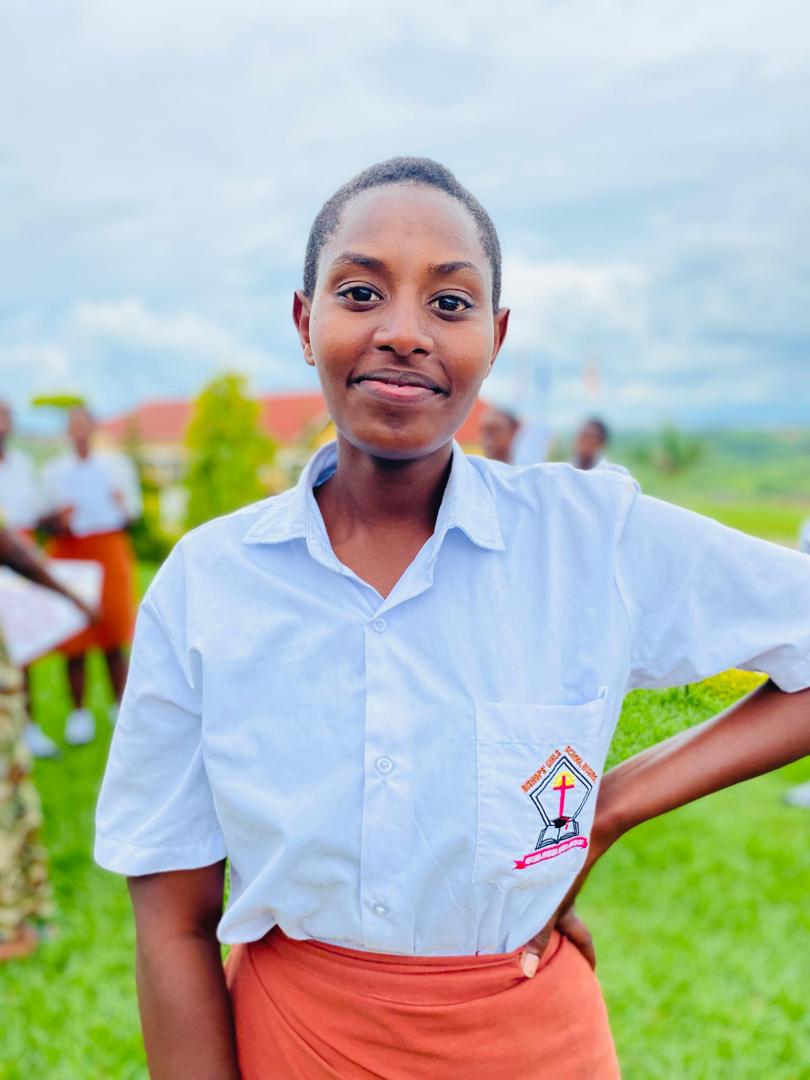
In Uganda today, the vision of free and inclusive education remains a national aspiration. Since the introduction of Universal Primary Education (UPE) in 1997 and Universal Secondary Education (USE) in 2007, the government has made notable strides toward improving access to learning for all children…
Read More
Joy for Children Uganda, through the Uganda Secondary School Expansion Project (USEEP) , has been actively engaging communities in a series of media engagements aimed at promoting education and encouraging parents and guardians to prioritize sending their children to school. Recognizing that educati…
Read More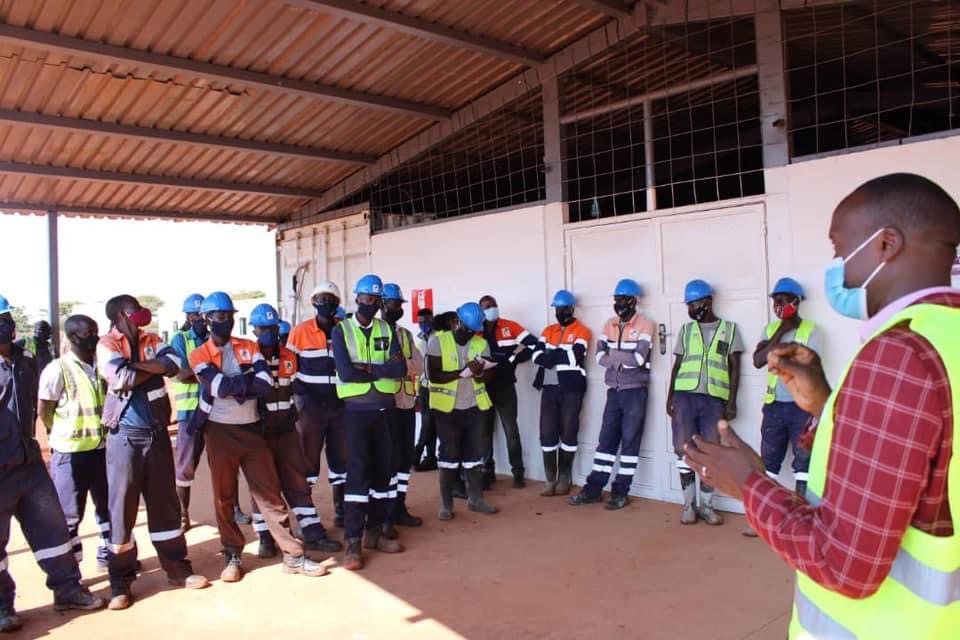
Joy for Children Uganda (JFCU) played a pivotal role in influencing the World Bank’s decision to strengthen child safeguarding mechanisms in response to issues arising from the Uganda Transport Sector Development Project (TSDP).In 2014, JFCU identified and raised serious human rights and social issu…
Read More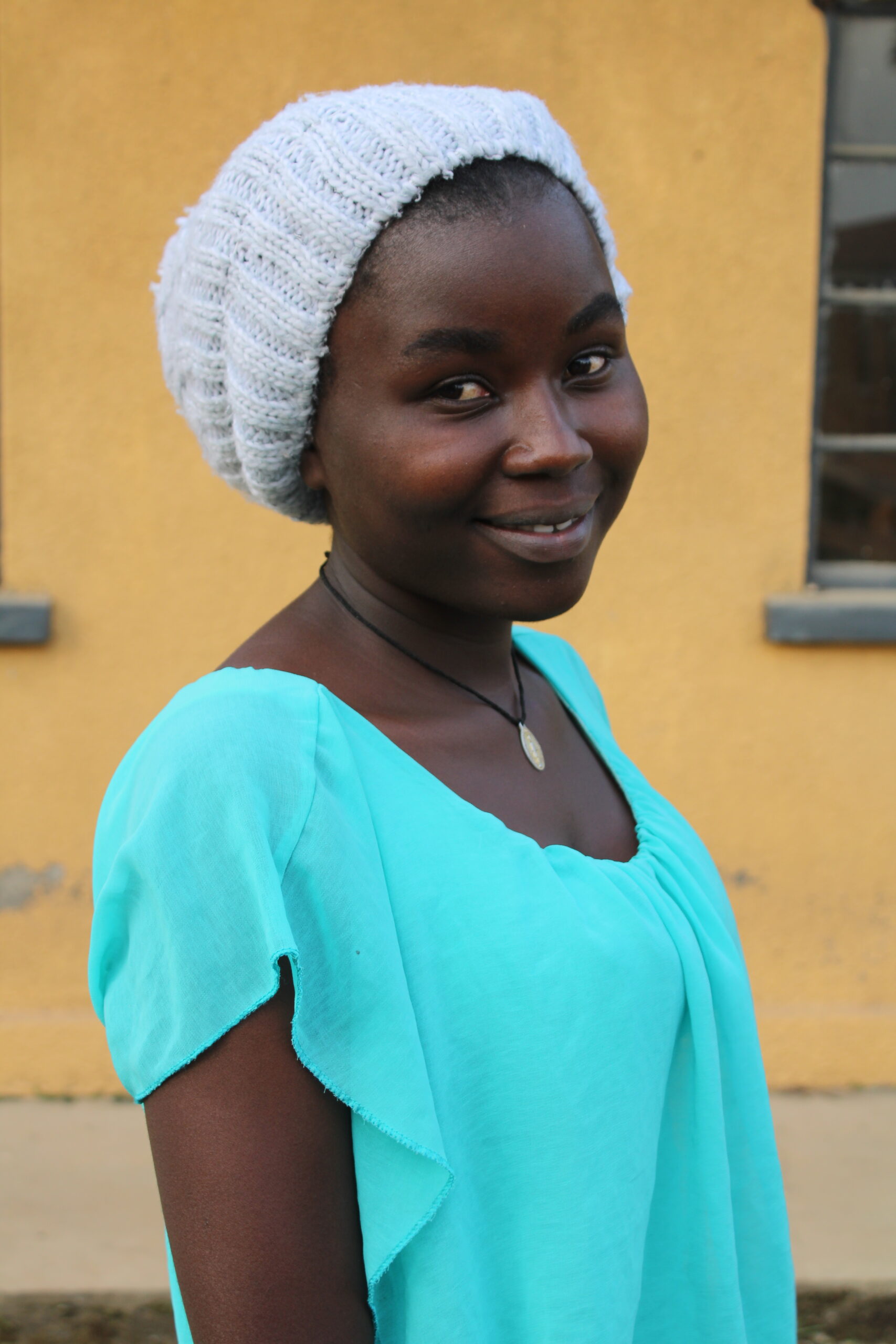
Period poverty continues to be a major issue for millions of girls, especially in rural areas, where access to menstrual hygiene products, clean water, and sanitation facilities is limited. In Uganda, many girls face this challenge, which prevents them from attending school during their menstrual cy…
Read More
Uganda is on the brink of a major health crisis following the withdrawal of USAID funding, a decision that has disrupted critical programs across the country. The immediate impact is being felt in health facilities like Komamboga Hospital, where thousands of people relying on lifesaving HIV treatmen…
Read More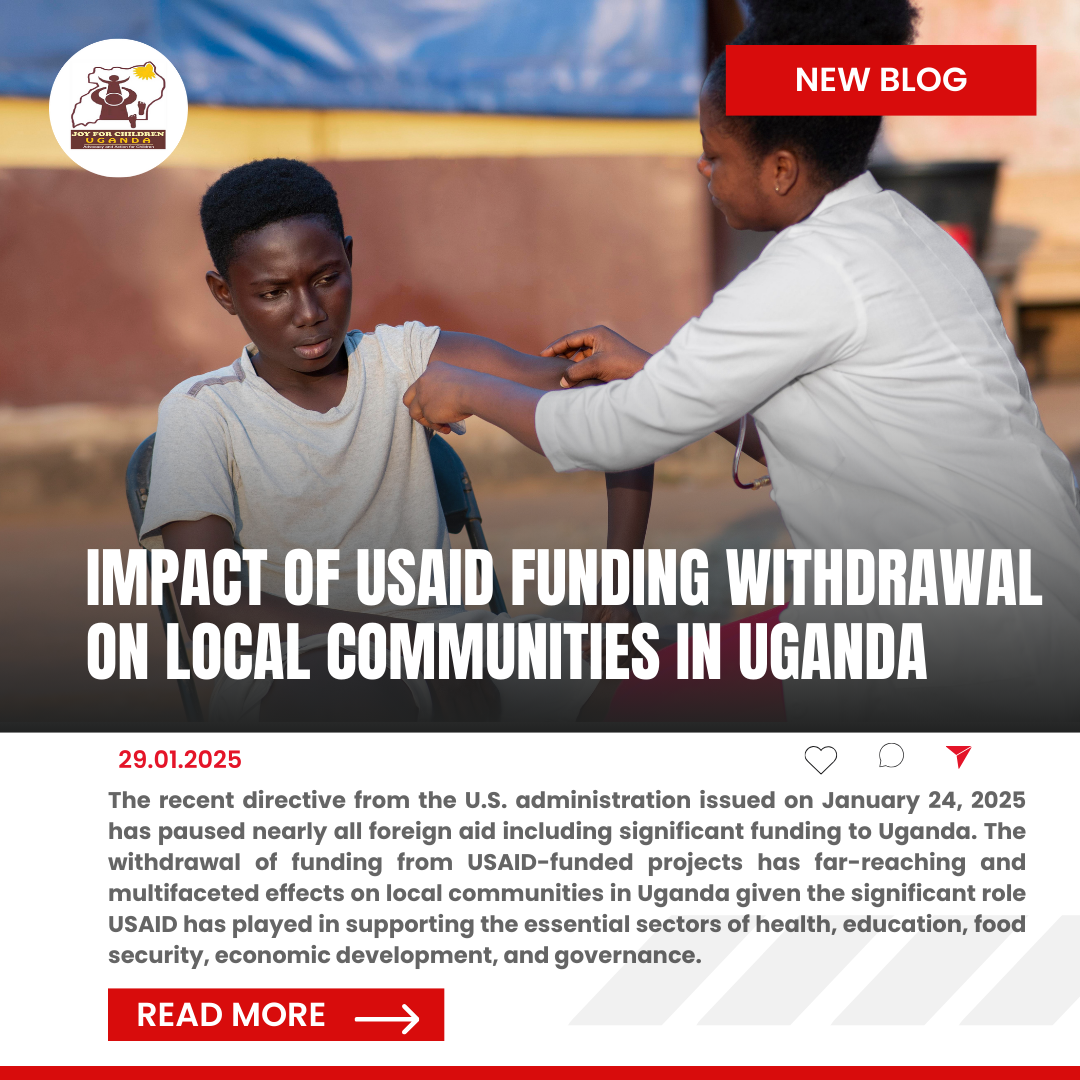
JANUARY 28, 2025
The recent directive from the U.S. administration issued on January 24, 2025 has paused nearly all foreign aid including significant funding to Uganda. The withdrawal of funding from USAID-funded projects has far-reaching and multifaceted effects on local communities in Uganda…
Read More
The International Day of Education, celebrated every year on January 24th, was proclaimed by the United Nations General Assembly in 2018. This day is dedicated to celebrating the role of education in fostering peace and development. It serves as a reminder of the vital importance of education in ach…
Read More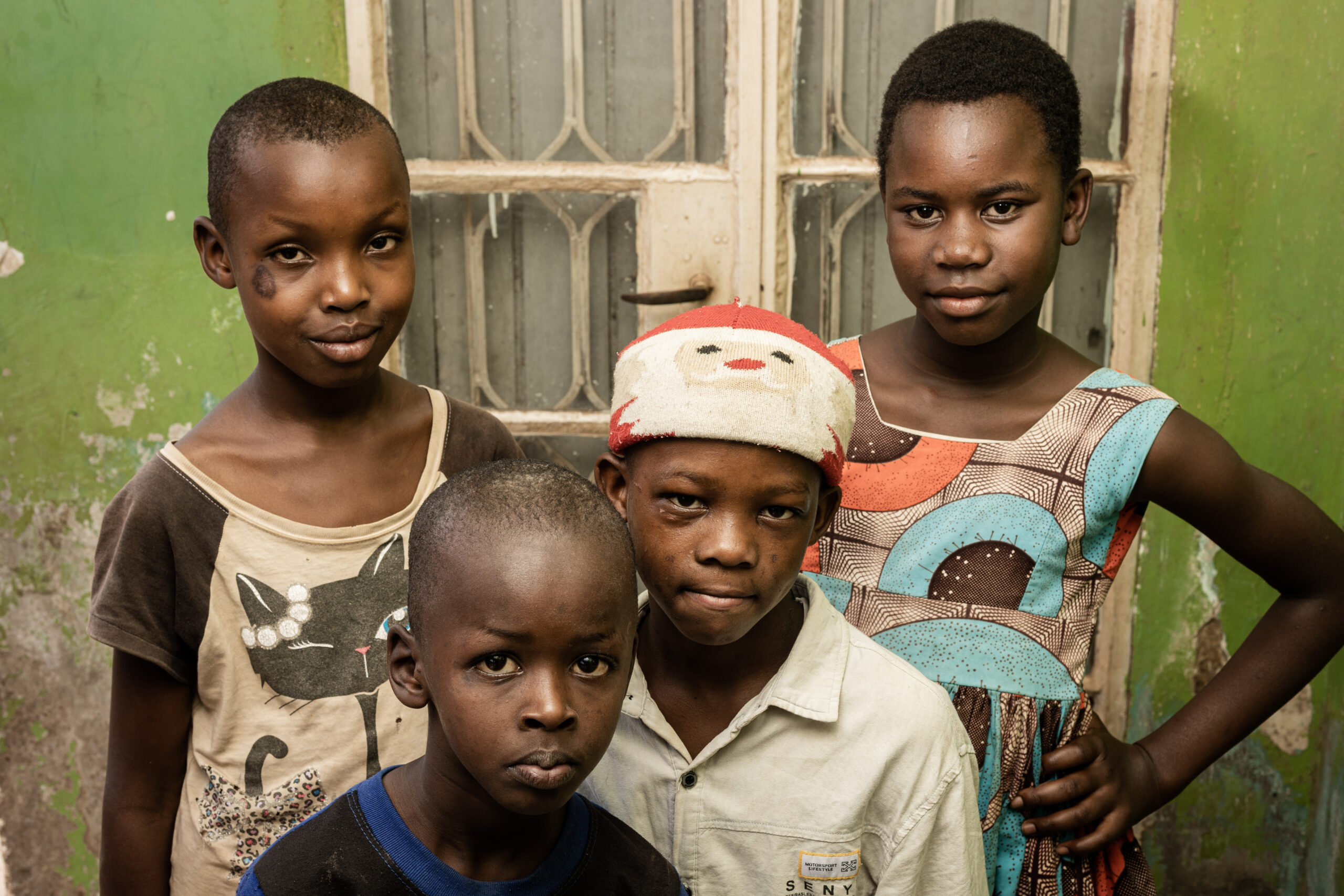
In Uganda, recent statistics indicate that the school dropout rate is notably high, particularlyamong girls. According to the Uganda Bureau of Statistics (UBOS) 2021 report, approximately 28% of girls in rural areas drop out of school, often due to factors such as poverty, early marriage, and limite…
Read More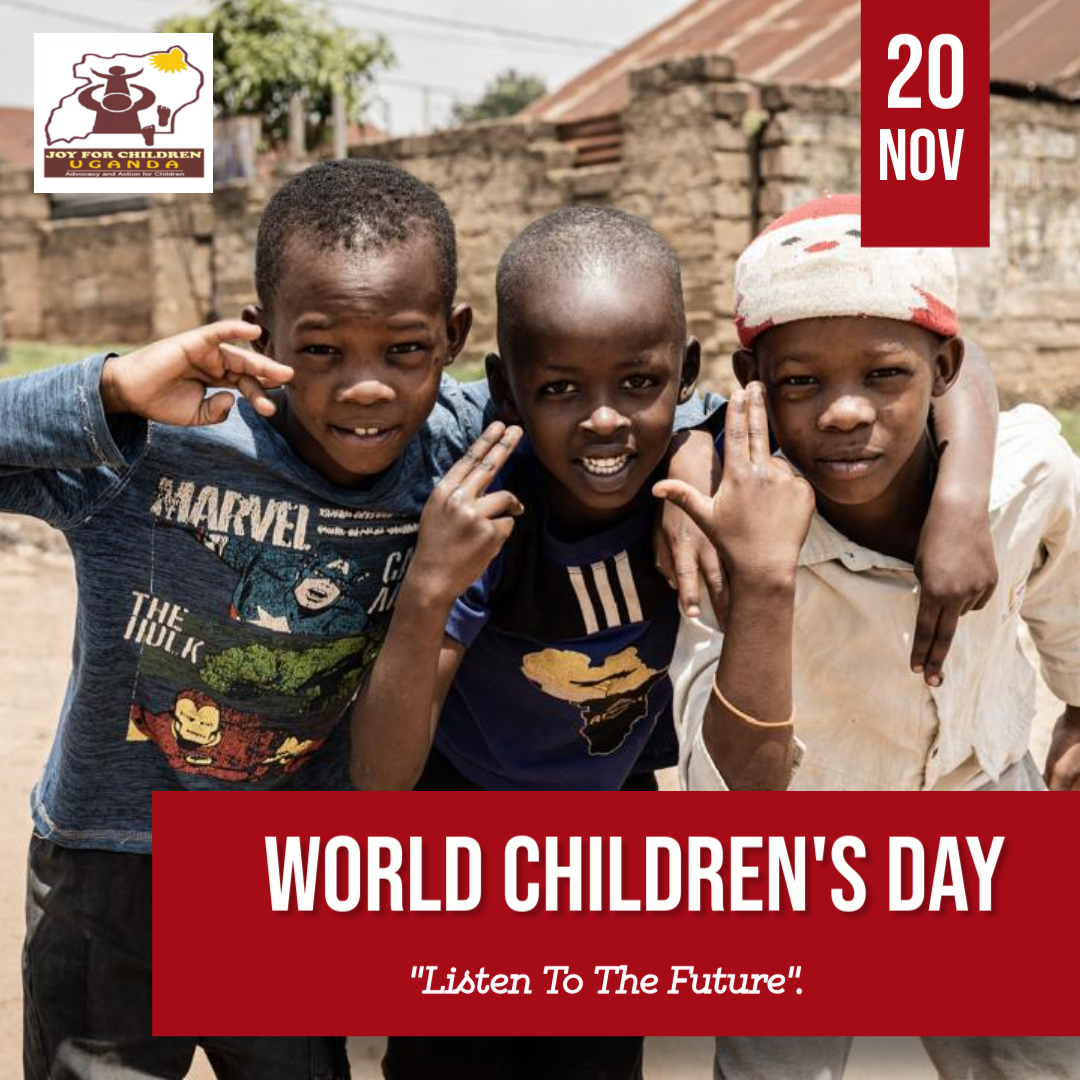
November 20th marks World Children’s Day, a global moment to reflect on children’s rights, celebrate their potential, and commit to building a better world for the next generation. This year, under the theme “Listen to the Future”, we are reminded of the importance of hearing children’s voices and p…
Read More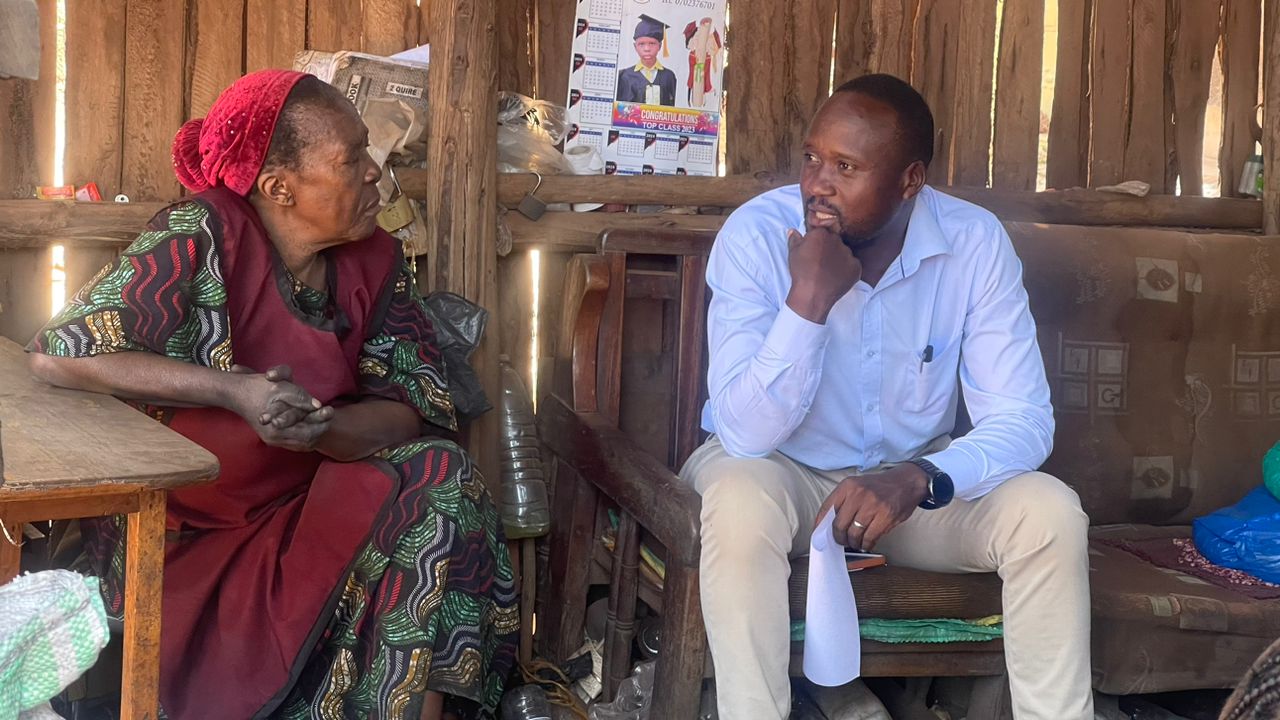
In the heart of Mulago , lives Jaja Margret, a 68-year-old woman who runs a charcoal business on Happy Street. Despite her age, Jaja Margret is the primary caregiver for her ten grandchildren, a responsibility that weighs heavily on her shoulders. Her story is not just one of personal struggle, it r…
Read More
JFCU with support from CRVPF established safe spaces for out of school adolescents to hold weekly discussions facilitated by peer mentors using the life skills manual to build their esteem, help them make better choices, protect themselves against violence, promote behavior change through addressin…
Read More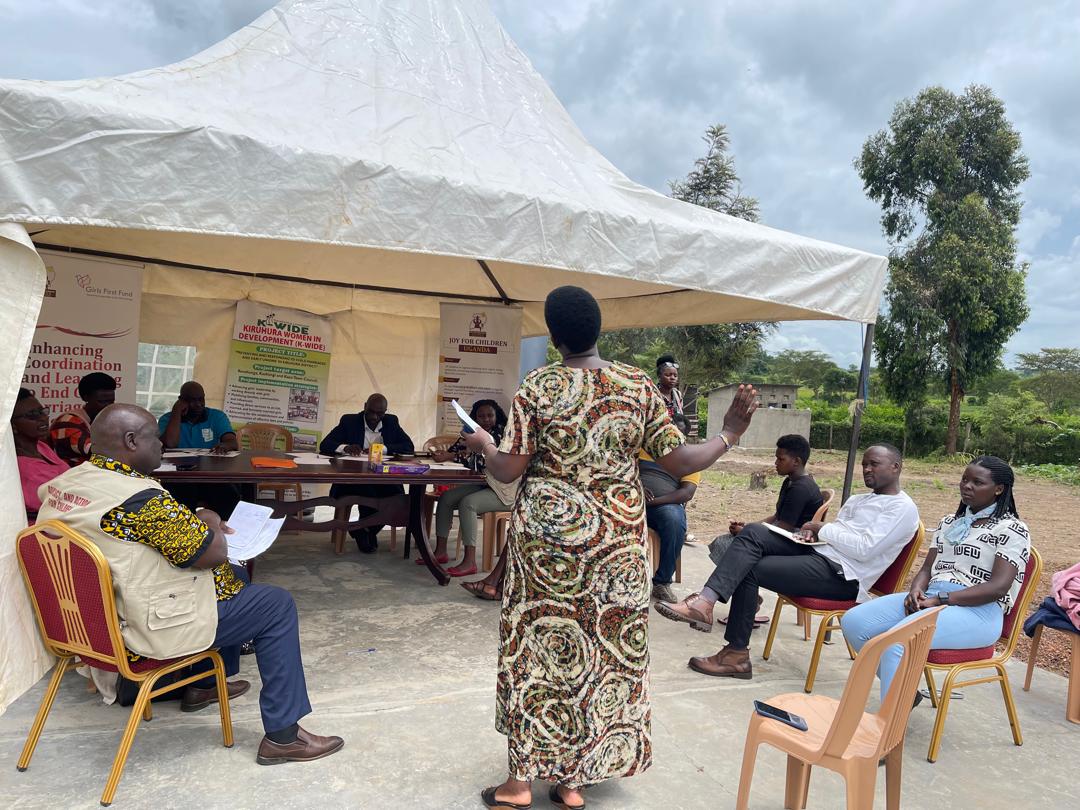
Cultural context significantly influences the acceptance of violence against children in Uganda. Traditional beliefs often regard physical punishment as a legitimate form of discipline, deeply rooted in community norms that emphasize obedience and respect for authority figures, such as parents and t…
Read More
Uganda is a country that is highly vulnerable to the impacts of climate change. The changing weather patterns are affecting agriculture, the main source of livelihood for many communities, leading to crop
failures and food shortages. This has forced families to resort to drastic measures to cope wit…
Read More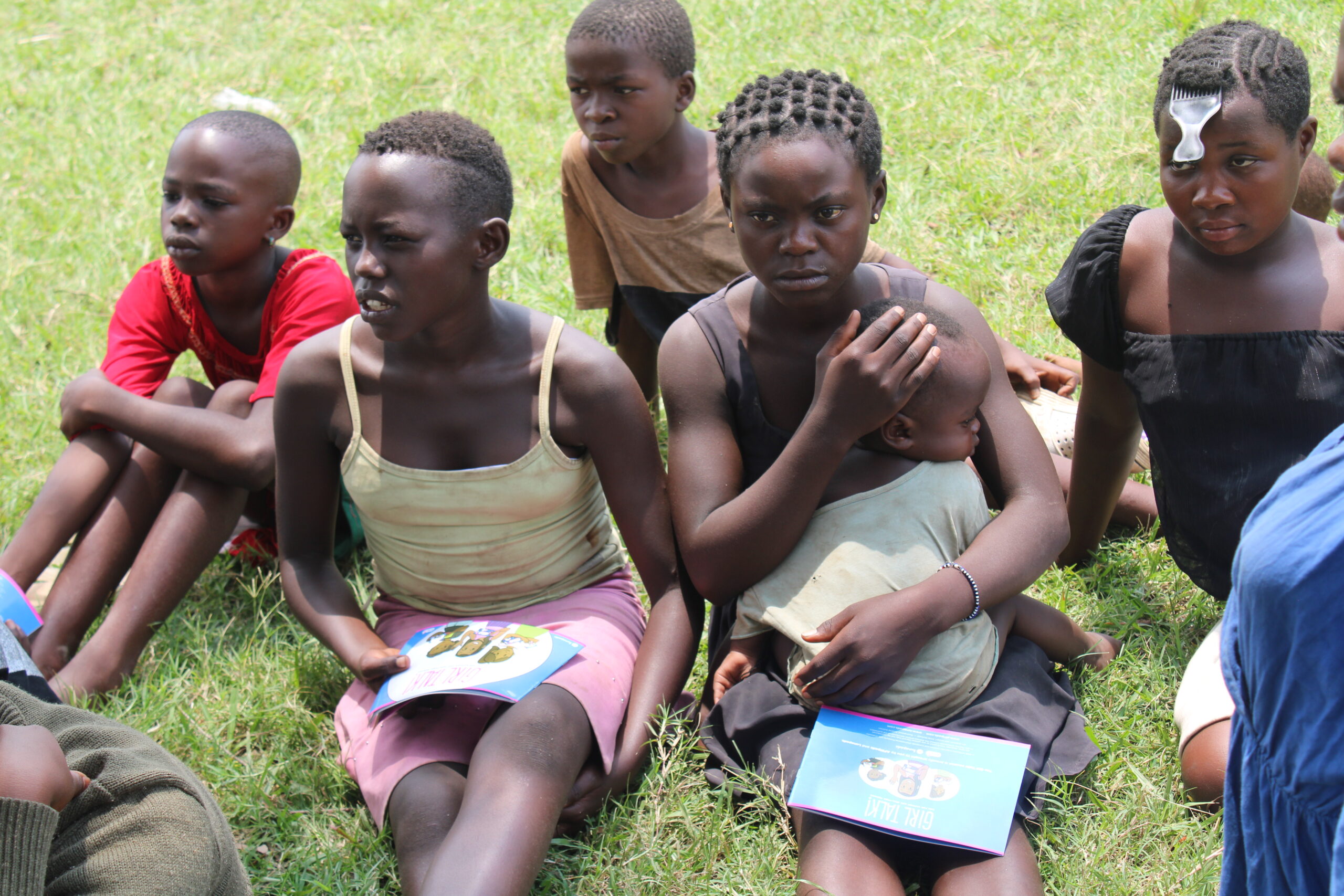
Education is an important tool in empowering girls and young women. When they stay in school they gain knowledge, skills and confidence which can help them make informed decision about their lives. However, in Uganda specifically in rural areas, many girls drop out of school early because of poverty…
Read More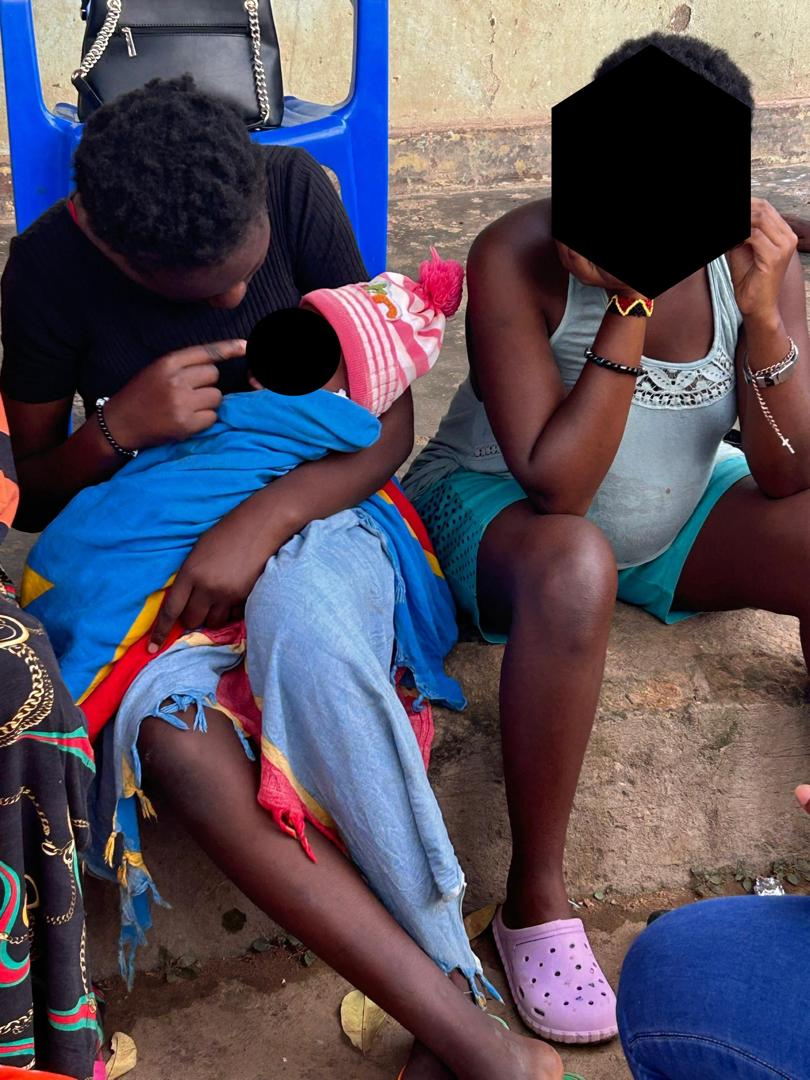
One of the main drivers of child marriage and teenage pregnancy in Uganda are the social, cultural norms and traditions as stated in the National Strategy to end child marriage and teenage pregnancies 2022/2023 – 2026/ 2027. It is a sad reality that in many communities a girl is seen as an economic …
Read More
In Uganda, like other East- African countries, Child marriage is one of the significant drivers of
adolescent pregnancy. 8.9 million Girls aged 10–19 are at risk of harmful practices, including
child marriage, teenage pregnancy and FGM, this represent nearly 27% of the country’s total population of …
Read More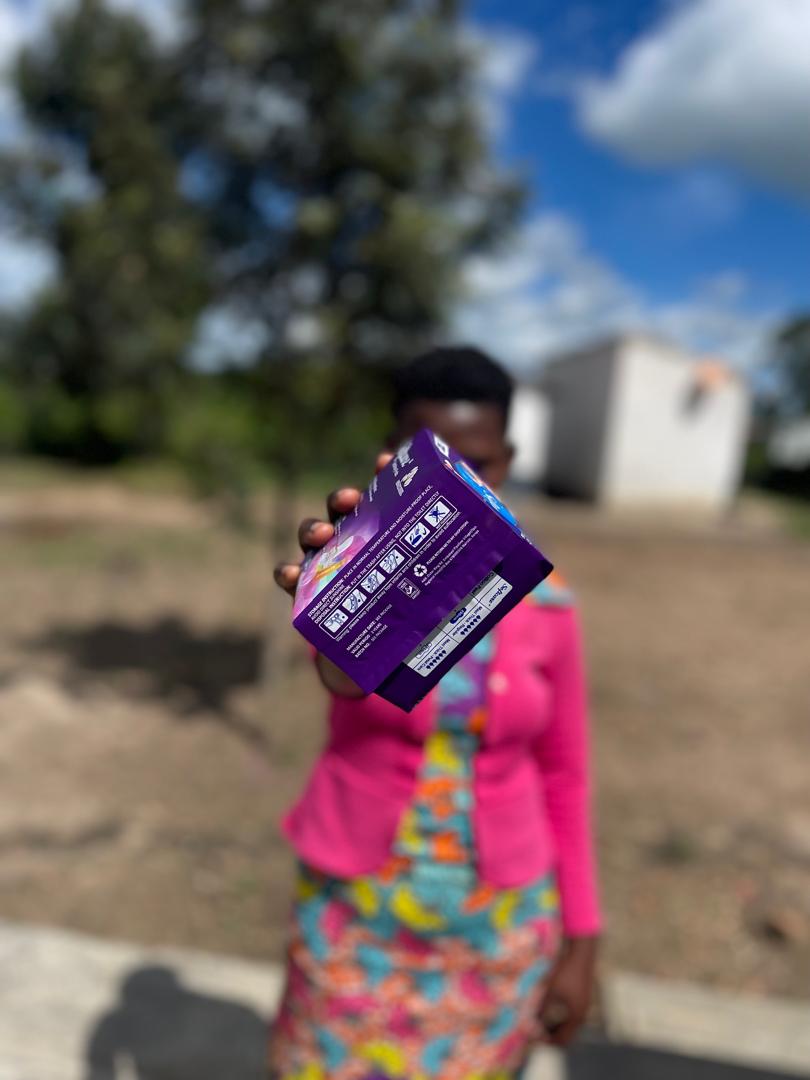
Period poverty exacerbates the vulnerability of girls to child marriage. When girls do not have access to menstrual products, they are often forced to stay home from school during their periods. This leads to gaps in their education and limits their opportunities for economic independence. Additiona…
Read More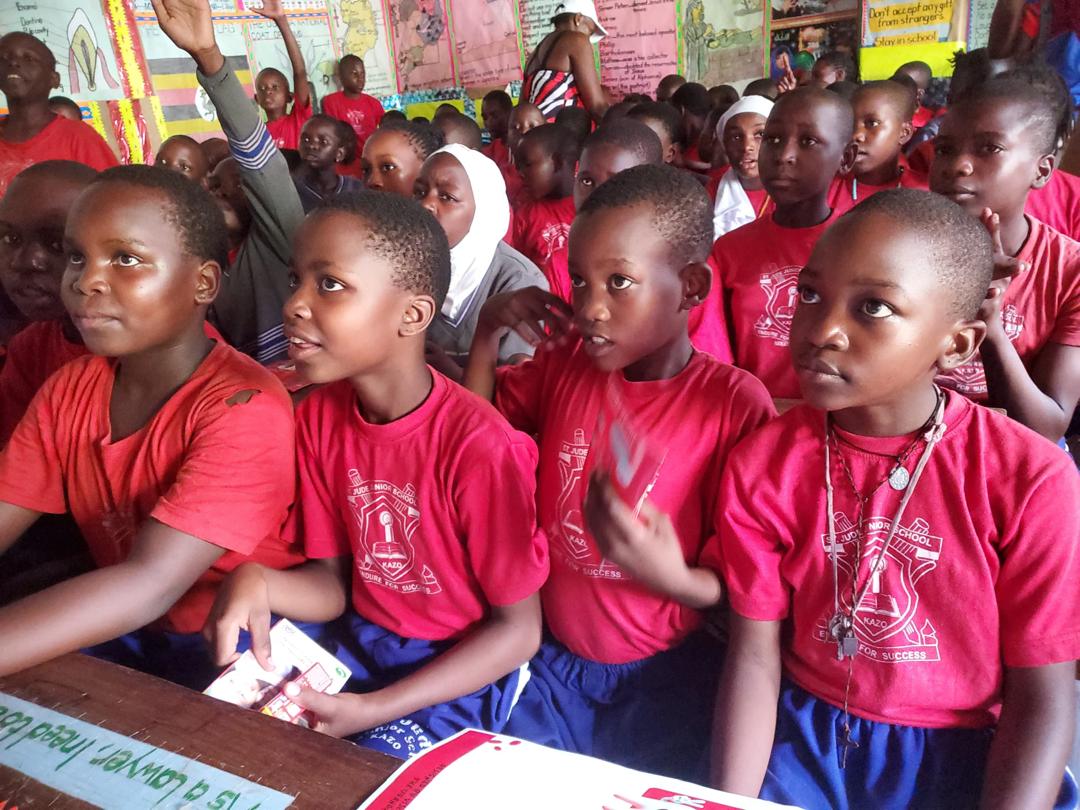
The International Day of the African Child is a day dedicated to raising awareness about the rights and well-being of African children. One of the most pressing issues facing African children today is access to quality education. Despite progress in recent years, many children in Africa still do not…
Read More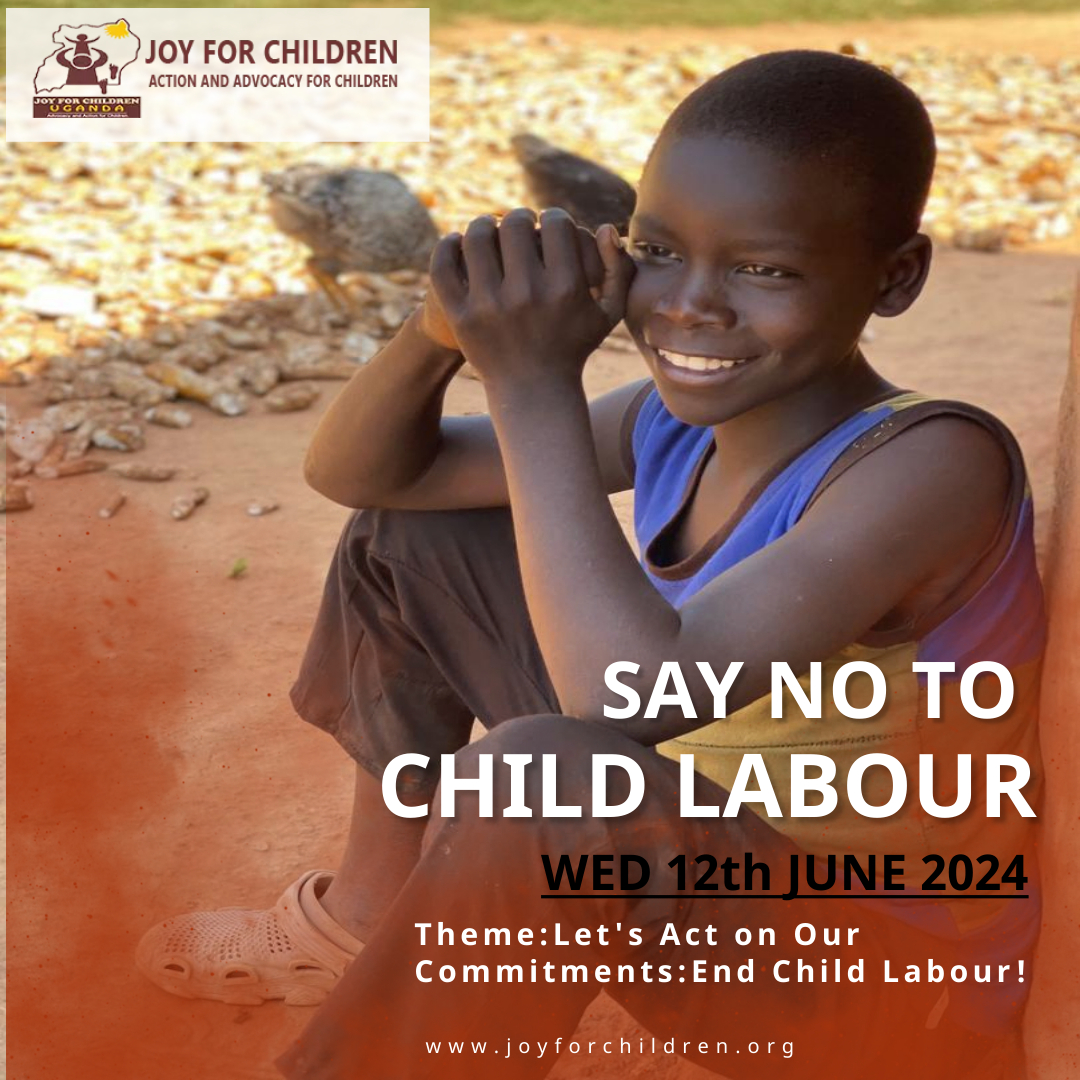
On June 12th, Joy for Children-Uganda joins the global community in commemorating the World Day Against Child Labor under the theme “Let’s Act on Our Commitments: End Child Labor!” .World Day against Child Labor is an annual observance held on June 12 to highlight the plight of child laborers and to…
Read More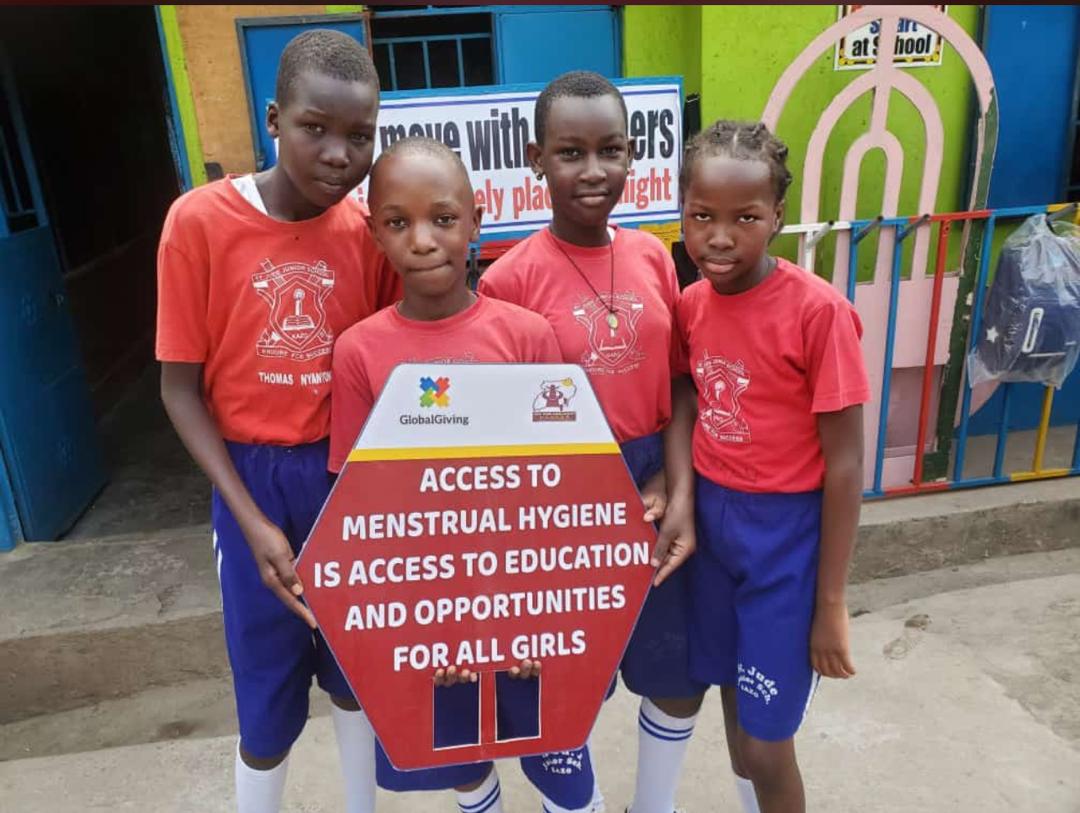
As we celebrate the Menstrual Hygiene Day themed “Together for a period friendly world” on May 28th, Joy for Children Uganda takes immense pride in reflecting on the achievements and progress made in promoting menstrual health and hygiene across the country. Over the past decade, Menstrual Hygiene D…
Read More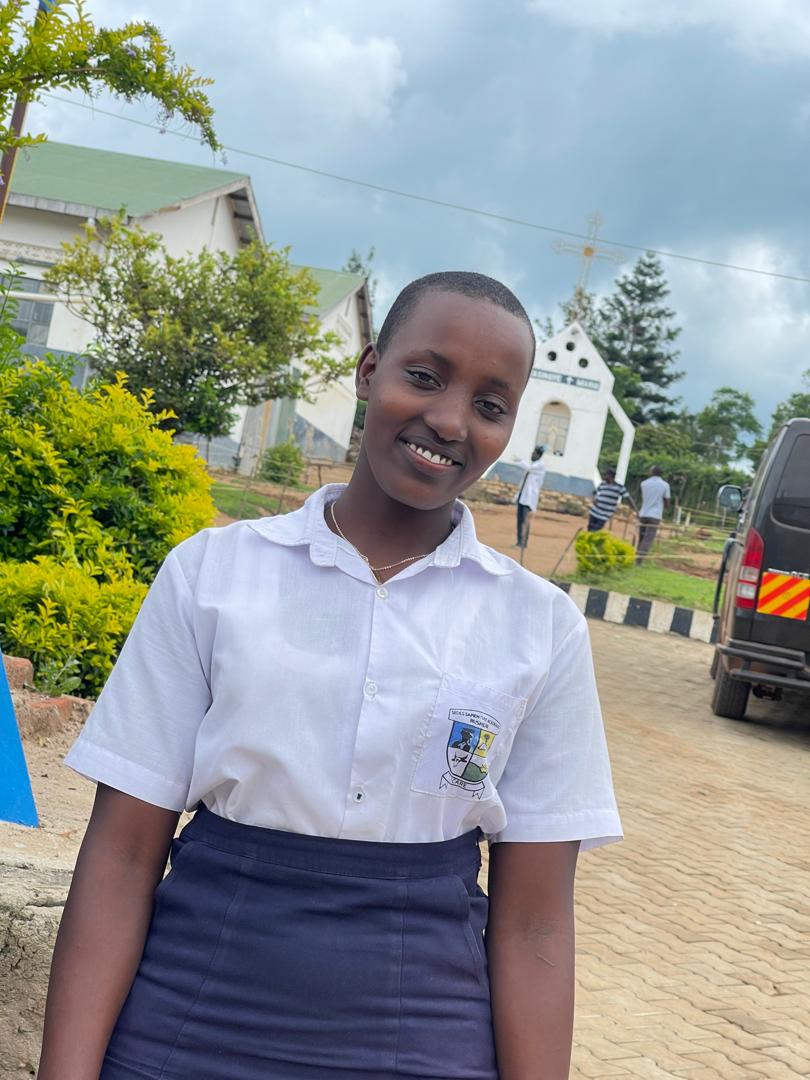
In today’s rapidly evolving world, education stands as the cornerstone of a prosperous future. It’s not merely about gaining knowledge, it’s about equipping our children with the tools they need to navigate life’s challenges, contribute to society, and fulfill their potential.…
Read More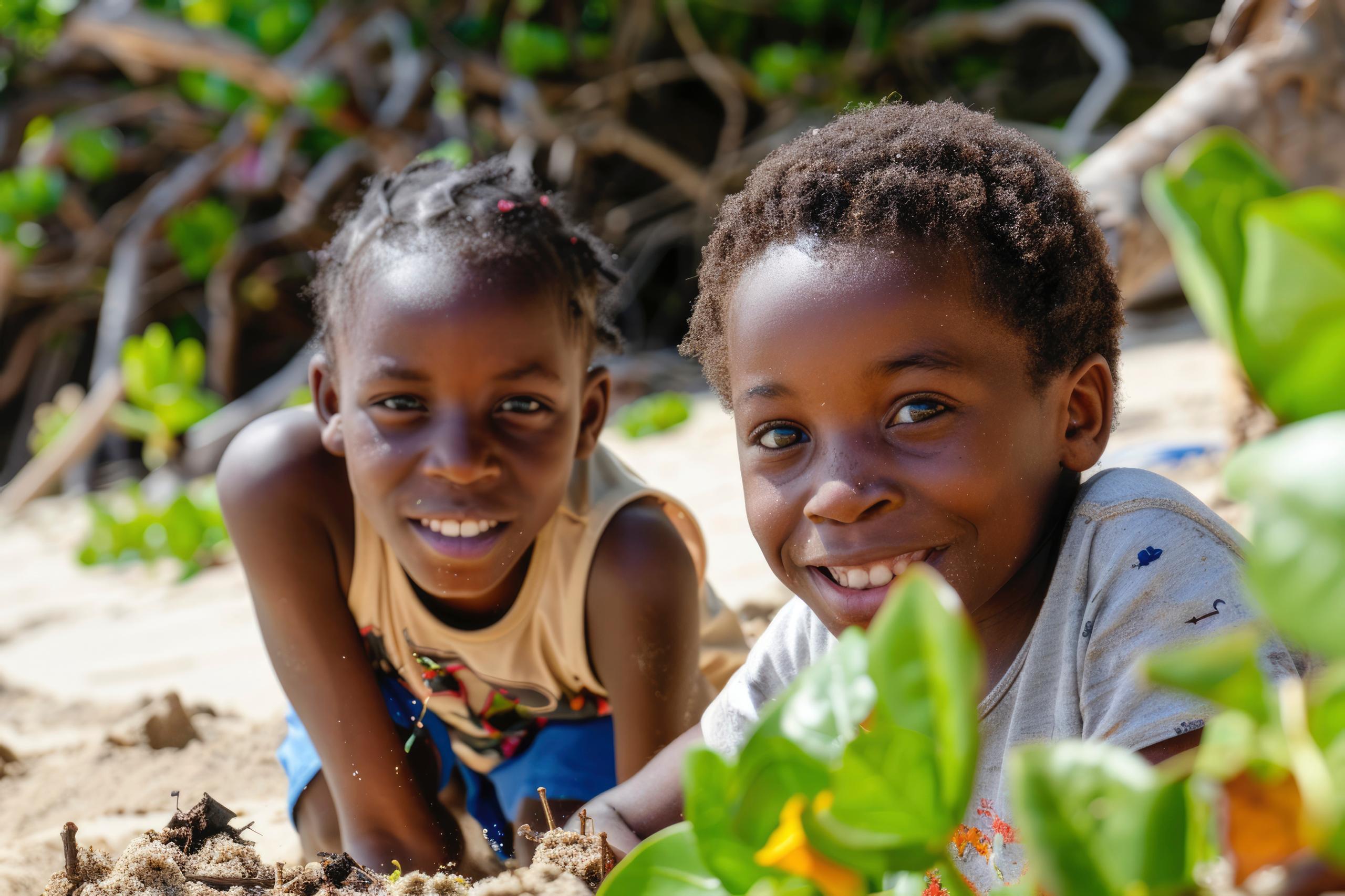
At Joy for Children Uganda, our mission is to create an inclusive world where every child, regardless of their abilities, has the opportunity to thrive and reach their full potential. Your unwavering support has been instrumental in driving this vision forward, and today, we invite you to join us in…
Read More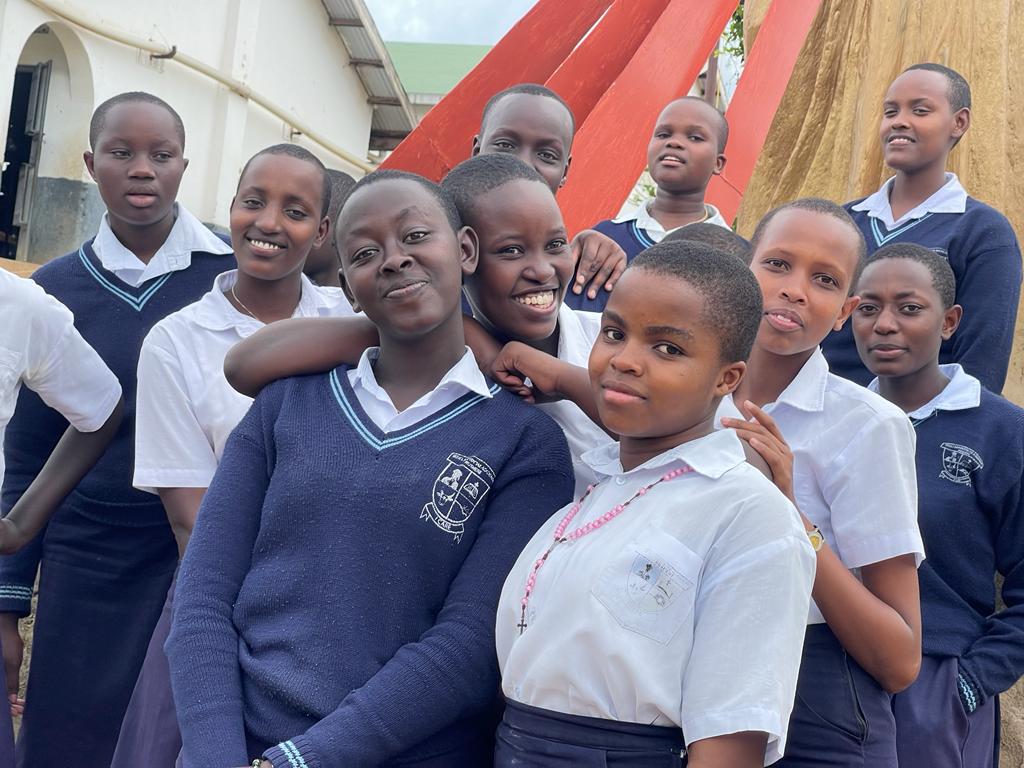
In recent years, the world has witnessed the devastating effects of climate change, leaving no corner untouched. However, amidst the rising temperatures and extreme weather events, it’s often the most vulnerable who bear the worst of these changes our children.…
Read More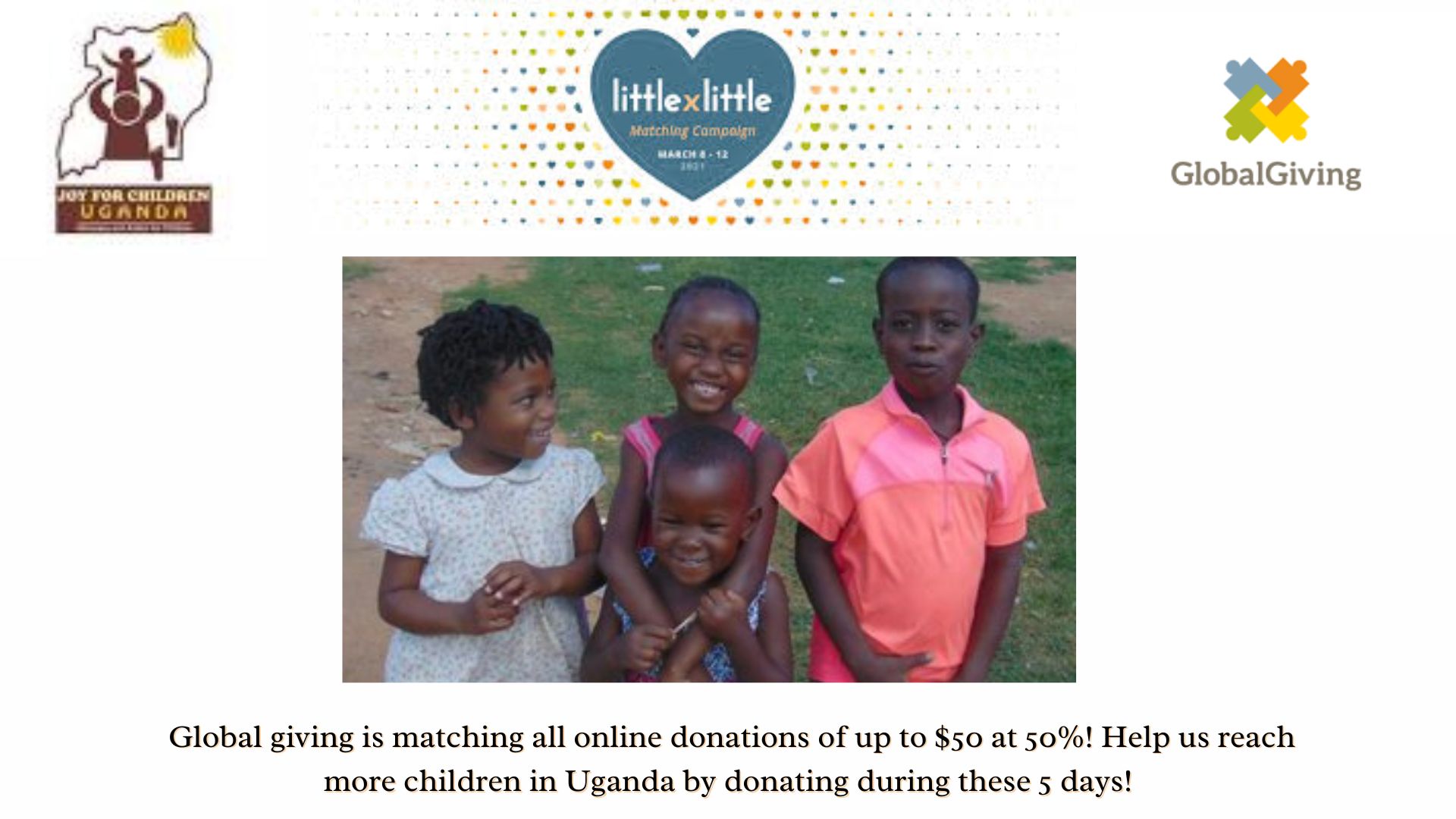
Menstrual hygiene management (MHM) in rural Uganda remains a pressing issue, affecting theeducation and well-being of countless young girls. The lack of access to sanitary products, proper facilities, and comprehensive education perpetuates stigma and hinders girls academicpotential.In Uganda, its e…
Read More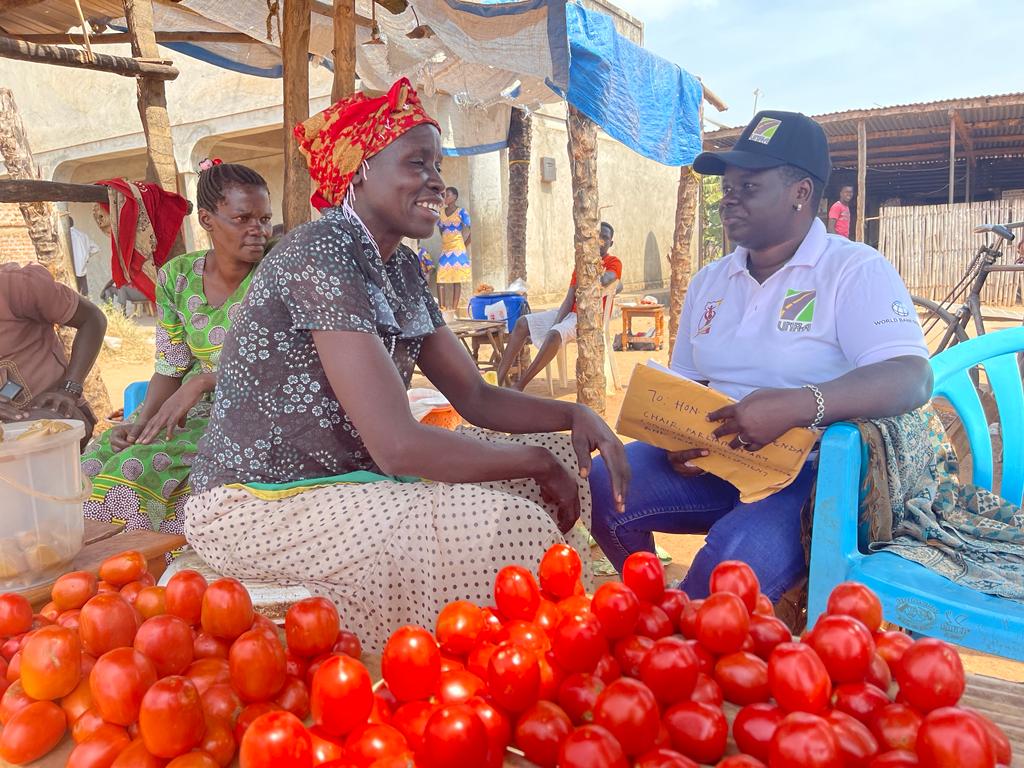
As the world celebrates International Women’s Day, the theme “Invest in Women: Accelerate Progress” rings louder than ever before. This year’s theme highlights the urgent need to prioritize investments in women and girls to drive meaningful progress towards gender equality and sustainable developmen…
Read More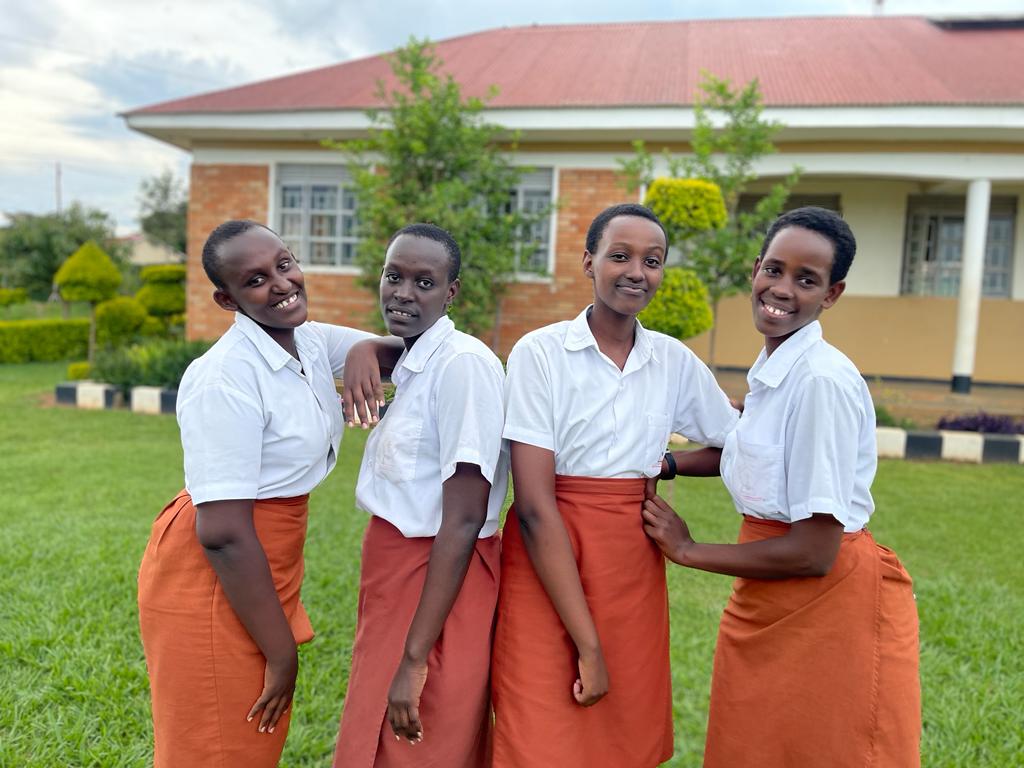
Child forced marriages remain a significant challenge in Uganda, with many girls being forced into marriage before the age of 18.Statistics from the Uganda Demographic and Health Survey (UDHS) of 2016 indicates that the prevalence of child marriage in Kiruhura district is 34 percent, which was high…
Read More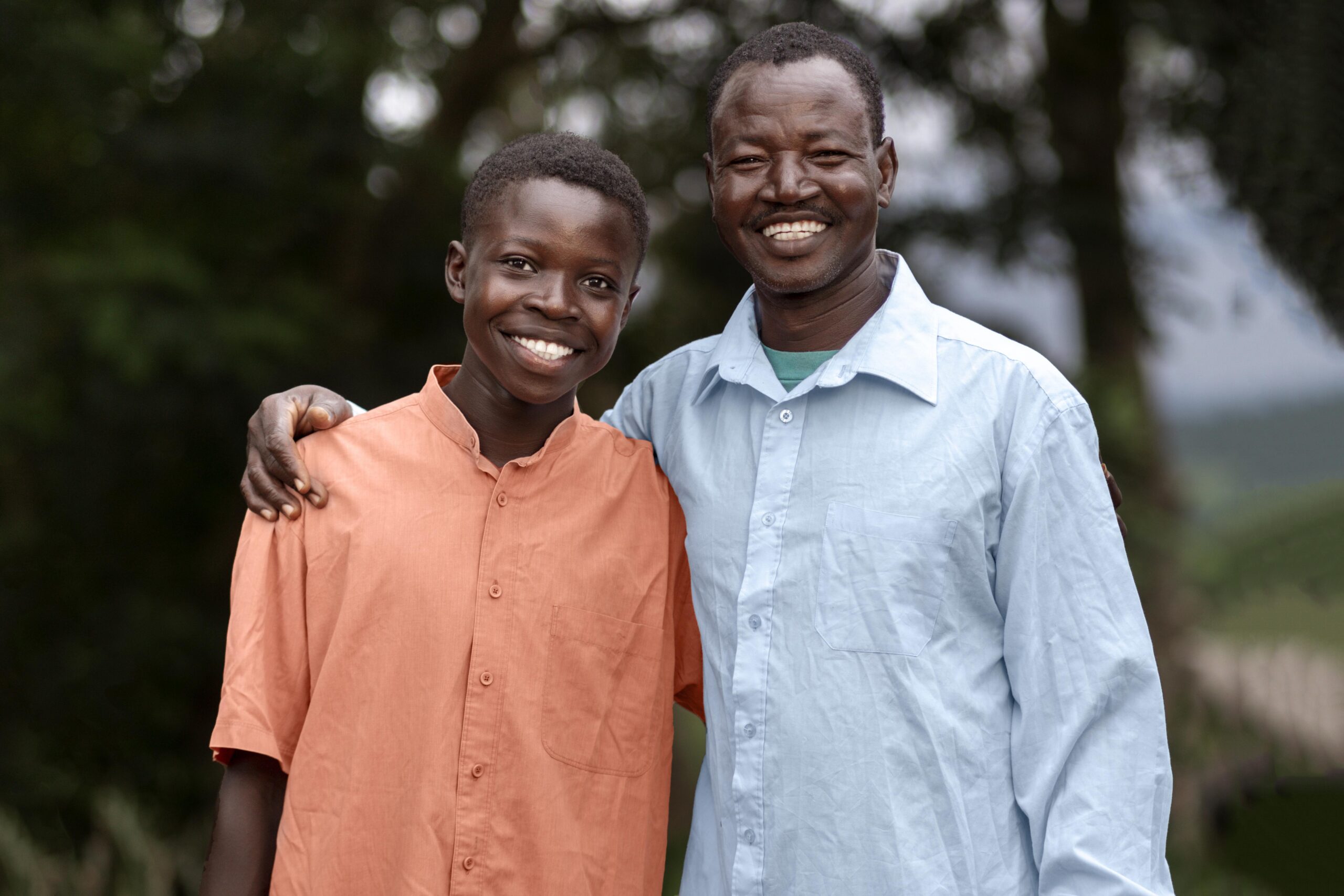
Child marriage is a pervasive issue in many parts of the world, with a multitude of contributing factors, one of which is toxic masculinity. To combat this harmful practice, it is essential to promote positive masculinity among men, encouraging them to be respectful, responsible, and empathetic.…
Read More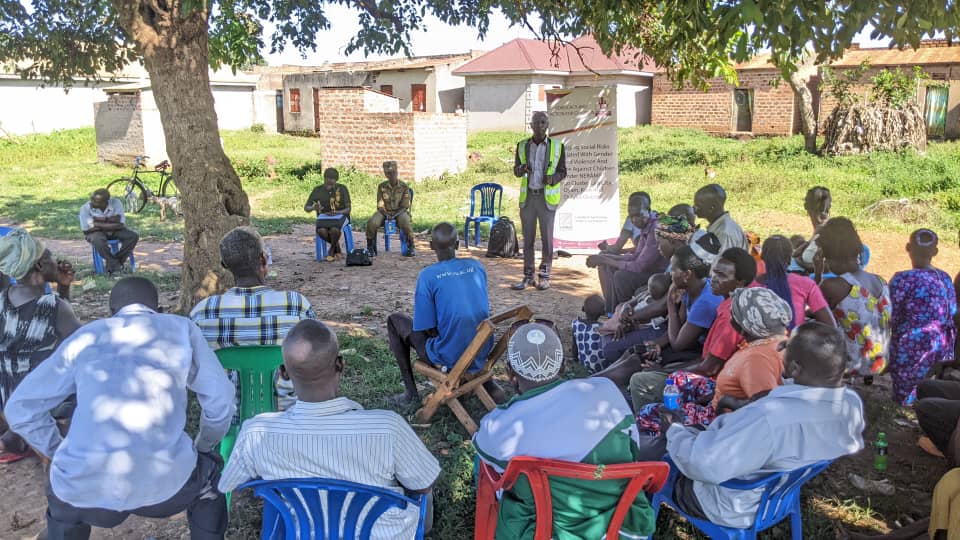
Violence against children is a pervasive and devastating problem in Uganda. It takes many forms, including physical, sexual, and emotional abuse, as well as neglect and exploitation. These forms of violence have long-lasting and detrimental effects on children, impacting their physical and mental he…
Read More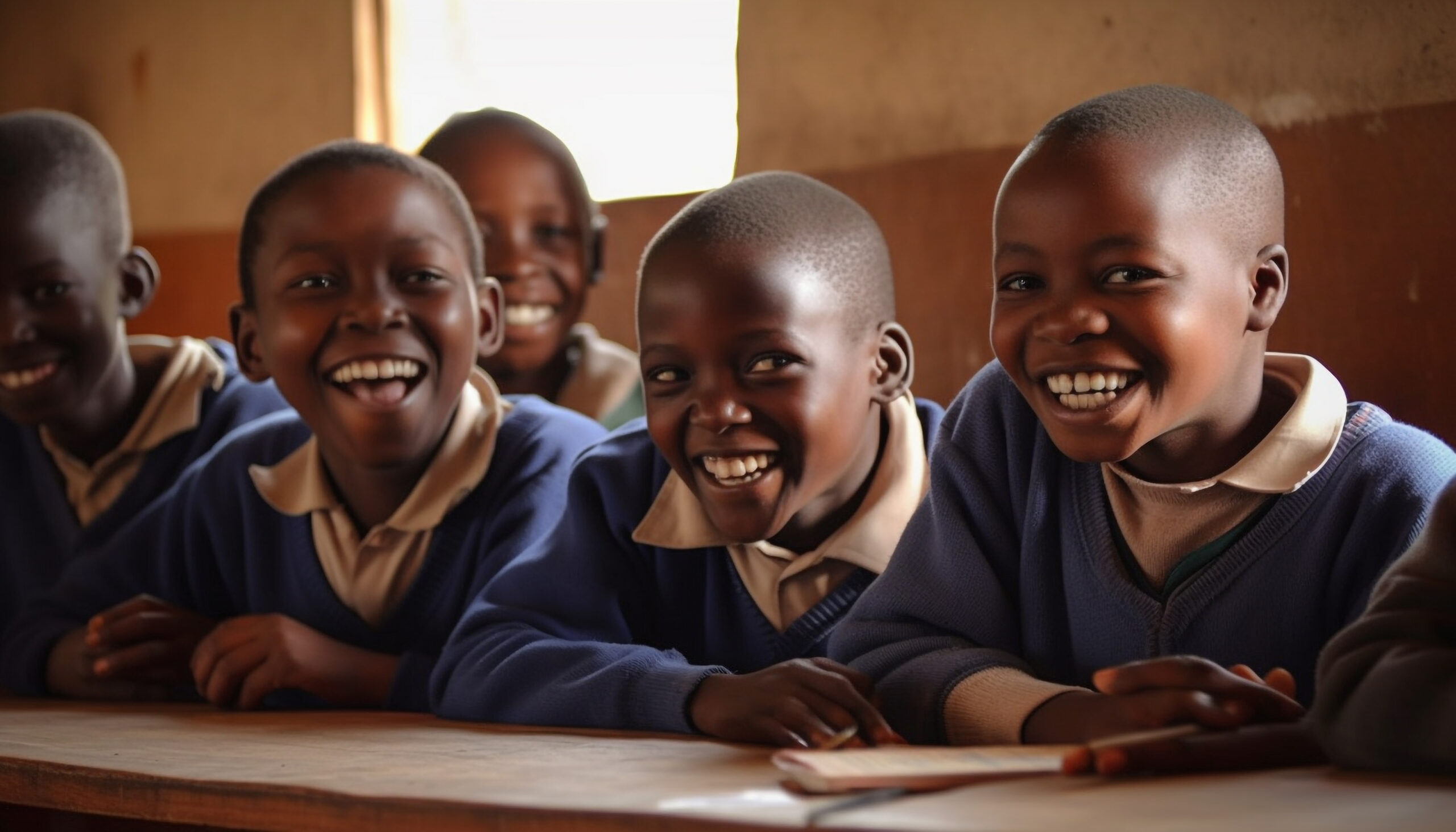
Child marriage is a global issue that affects millions of young girls every year. In Uganda, child marriage is a prevalent problem, with 34% of girls getting married before the age of 18. This practice not only robs these young girls of their childhood but also limits their opportunities for educati…
Read More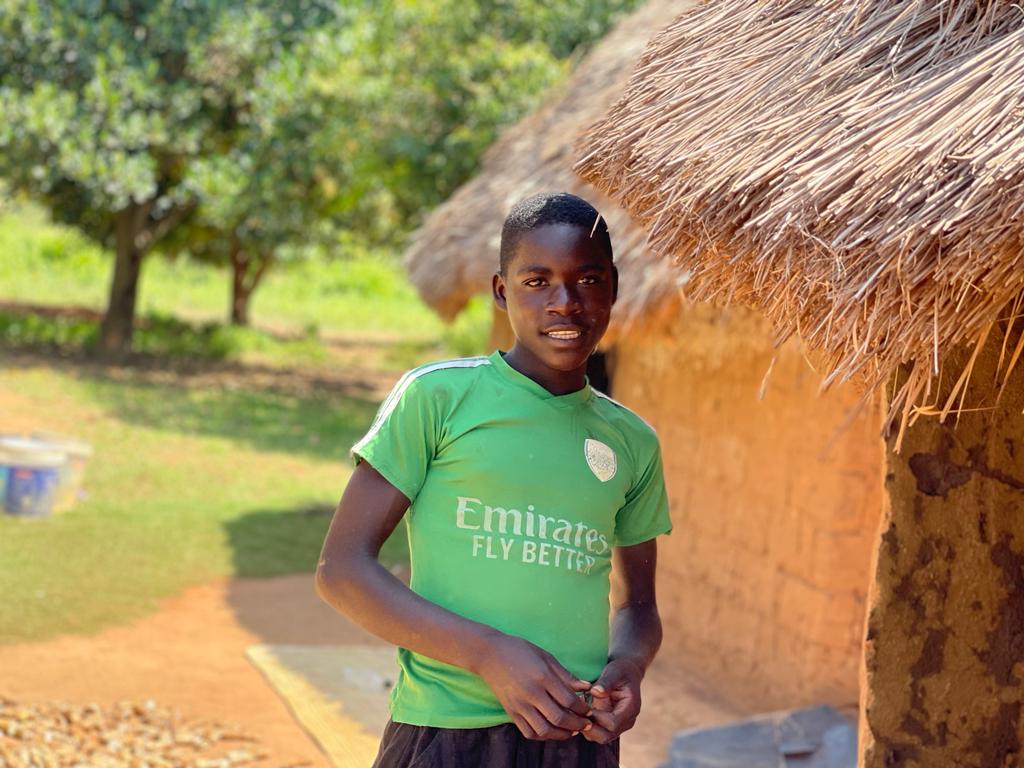
Child marriage is a harmful practice that violates the rights of children, particularly girls. It robs them of their childhood, education, and opportunities, and exposes them to increased risks of violence, abuse, and exploitation. While child marriage is an issue that predominantly affects girls, t…
Read More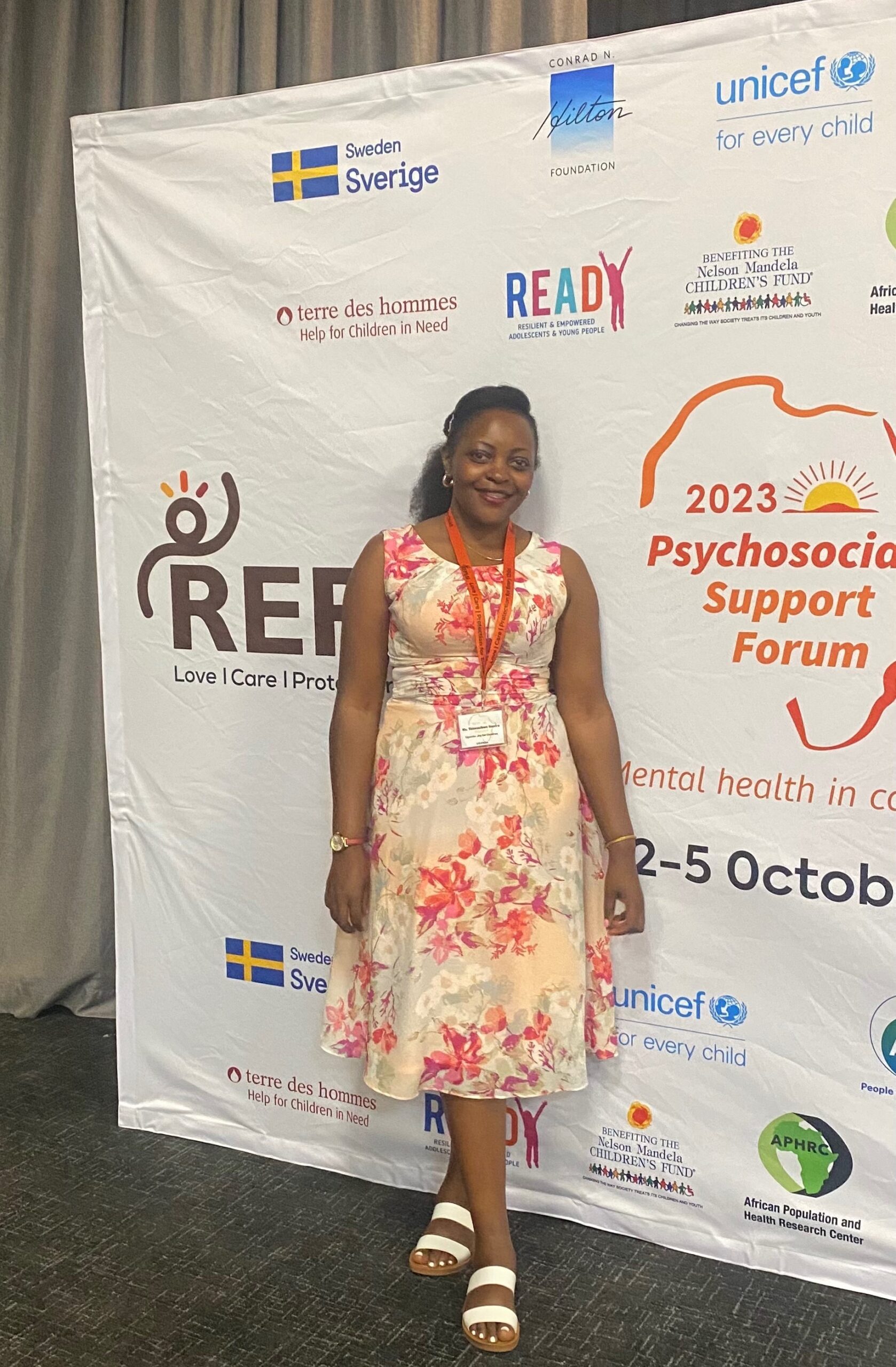
The 7th Regional PSS Forum, under the theme “Mental Health in Context” took place at the Birchwood Conference Centre in Johannesburg from the 4th to 5th of October 2023. It was organized jointly with REPSSI, the Nelson Mandela Children’s Fund, UNICEF ESARO, University of Pretoria and Africa Populati…
Read More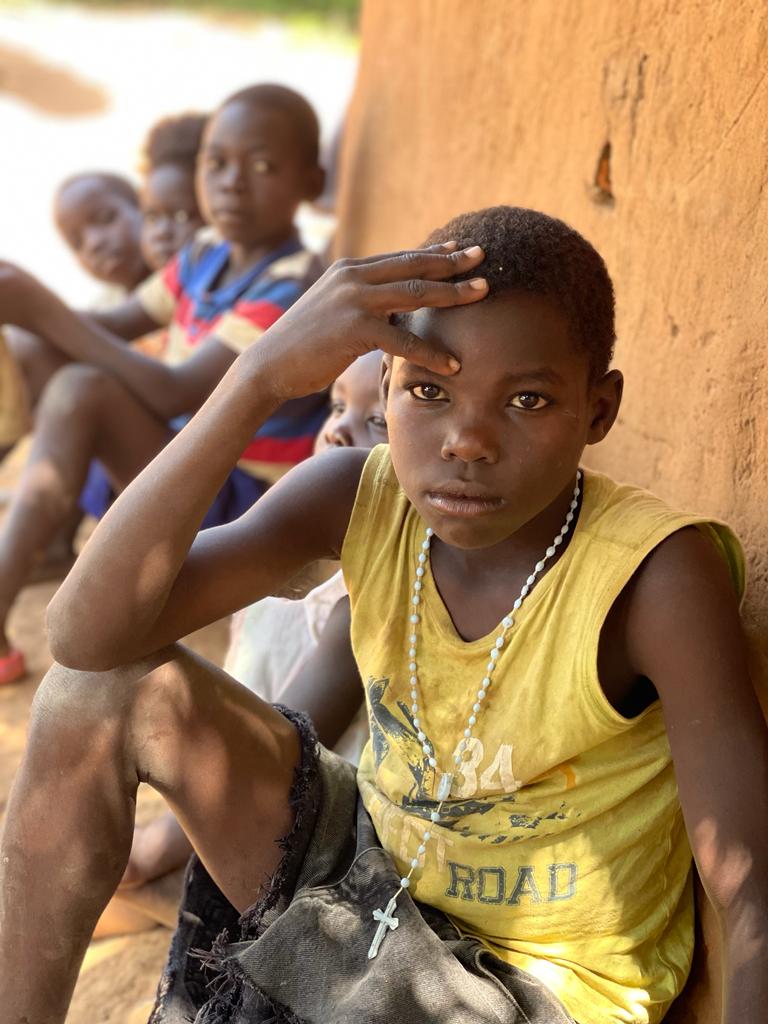
Child sexual abuse refers to the involvement of a child (person less than 18 years old) in sexual activity. Child sexual abuse (CSA) is a violation of the fundamental rights of a child and is deeply rooted in harmful gender norms. It is exacerbated by poverty, insecurity, displacement, drug abuse, c…
Read More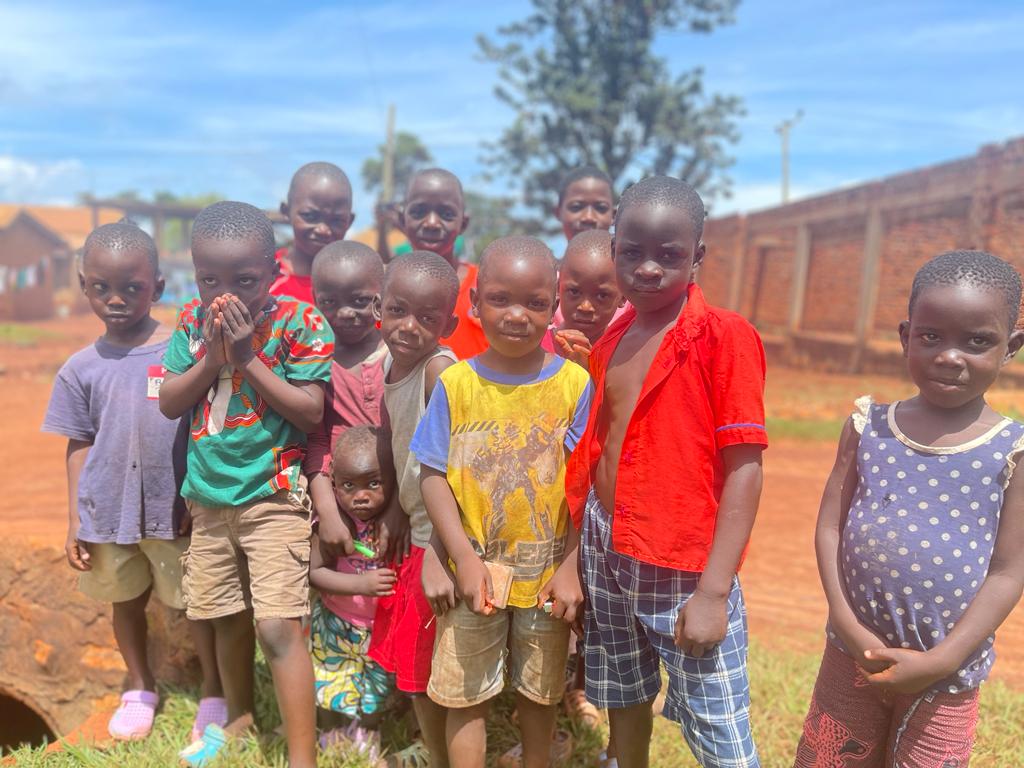
Violence is defined under article 19 of the Convention on the Rights of Children to mean all forms of physical or mental violence, injury and abuse, neglect or neglect treatment, maltreatment or exploitation, including sexual abuse. Violence against children physical, psyclogical and mental violence…
Read More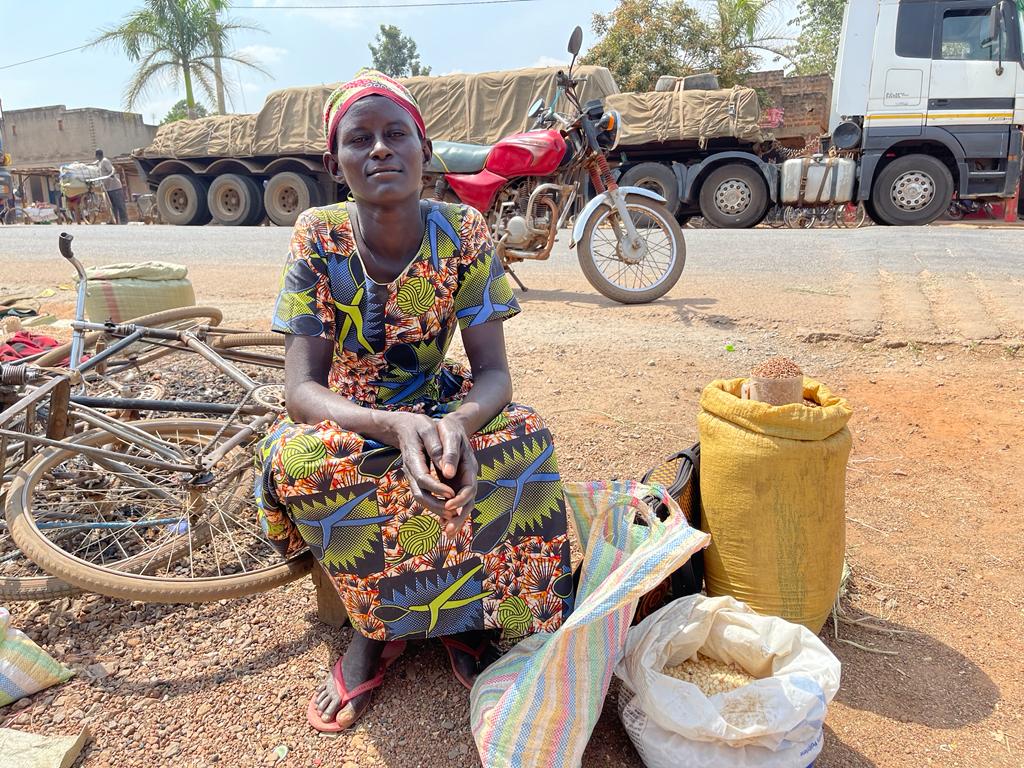
Families therefore serve an important mechanism for organizing social relationships by conferring certain rights and privileges and imposing duties. It organizes caregiving plus economic and other welfare to its members. It also provides refuge and a source of protection from conflict. Whereas famil…
Read More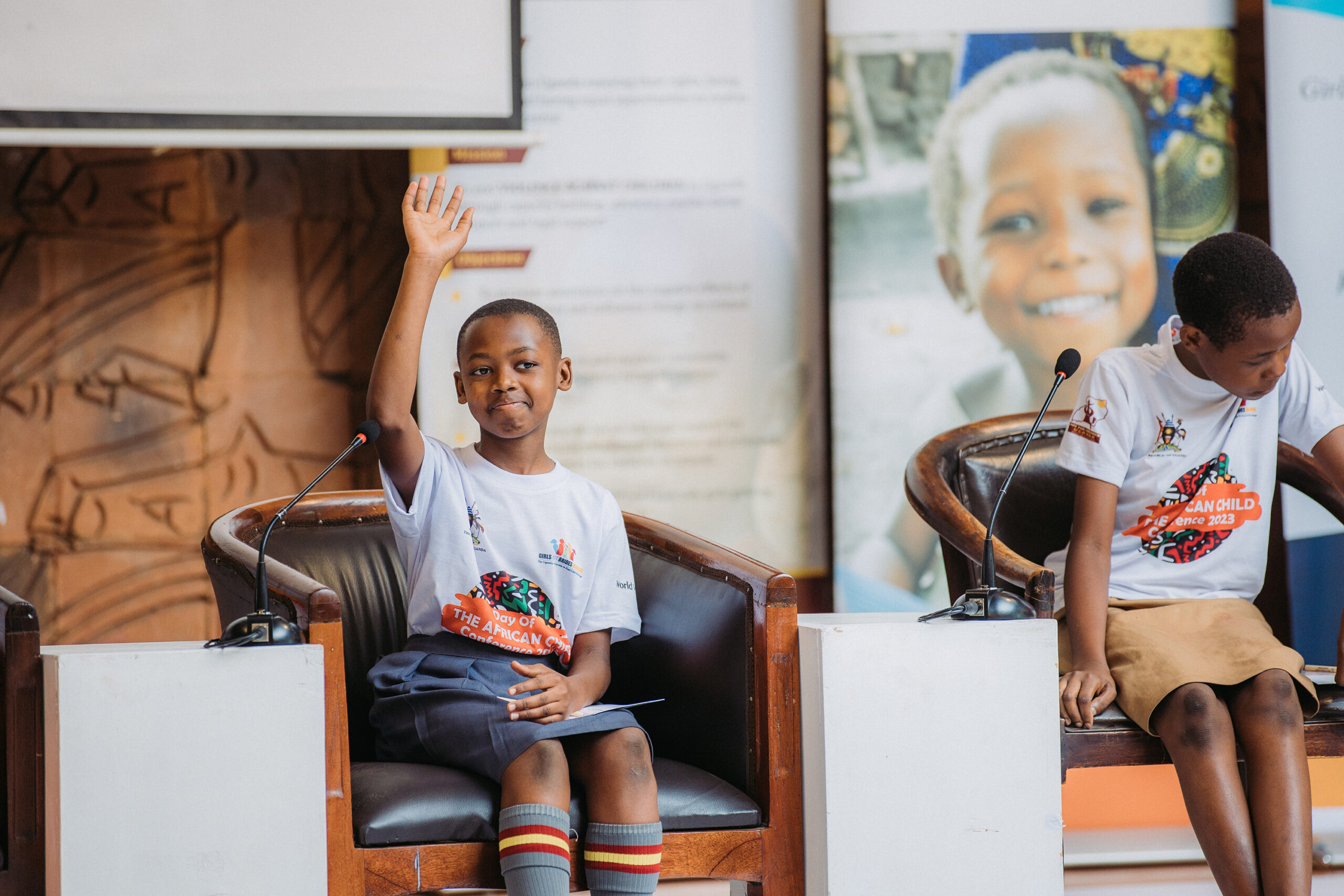
Education is widely considered to be one of the most important factors in delaying the age of marriage for girls. In developing countries evidence shows that the more education a girl receive, the less likely she is to be marriage before the age of 18 and more likely she is to delay pregnancy and c…
Read More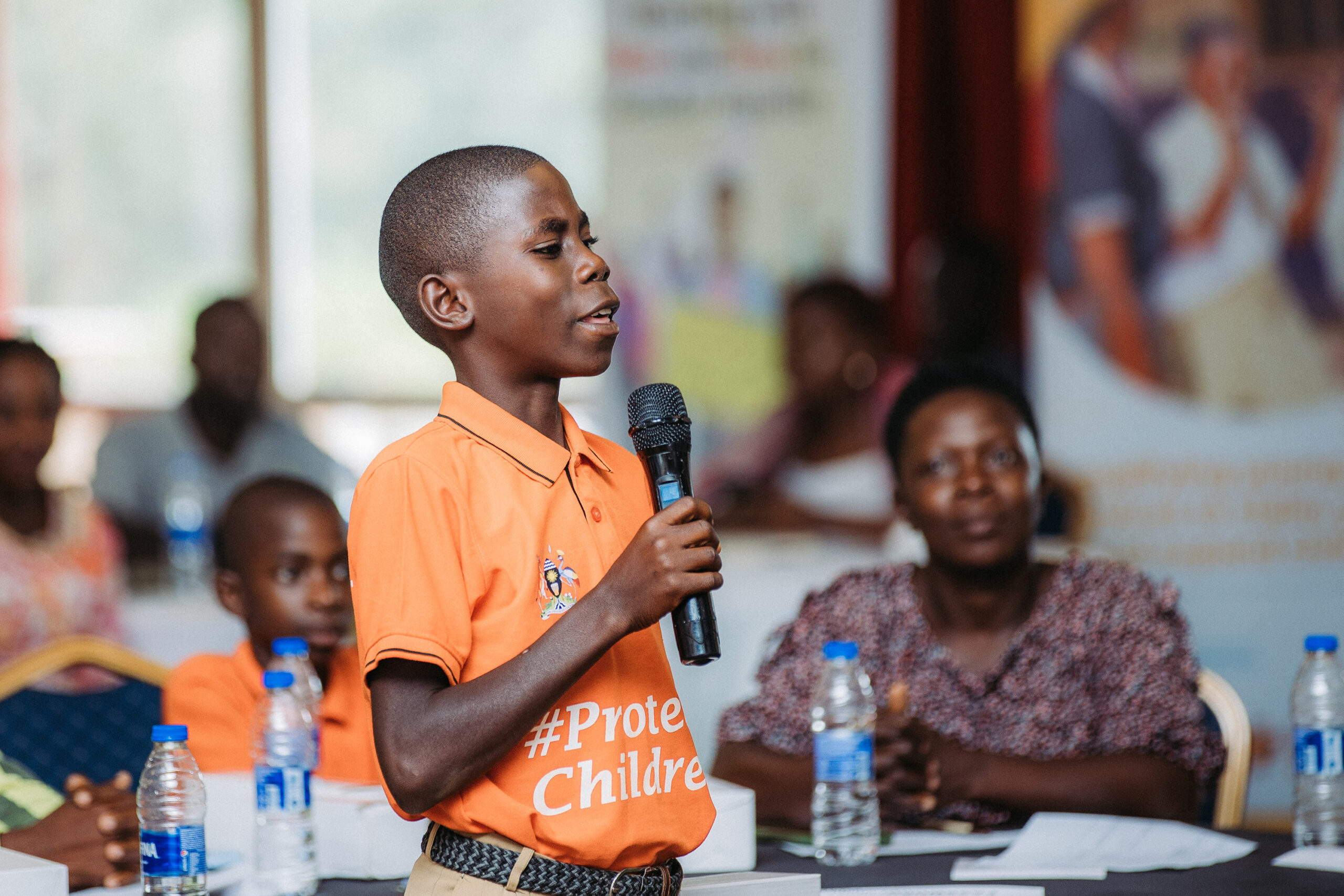
Activists have been primarily focusing on the devastating impact of child marriage on girls and girl’s education but in this case boys are also being affected.
According to Girls not Brides , 34% of girls in Uganda are married before their 18th birthday and a 7% are married before the age of 15. 6%…
Read More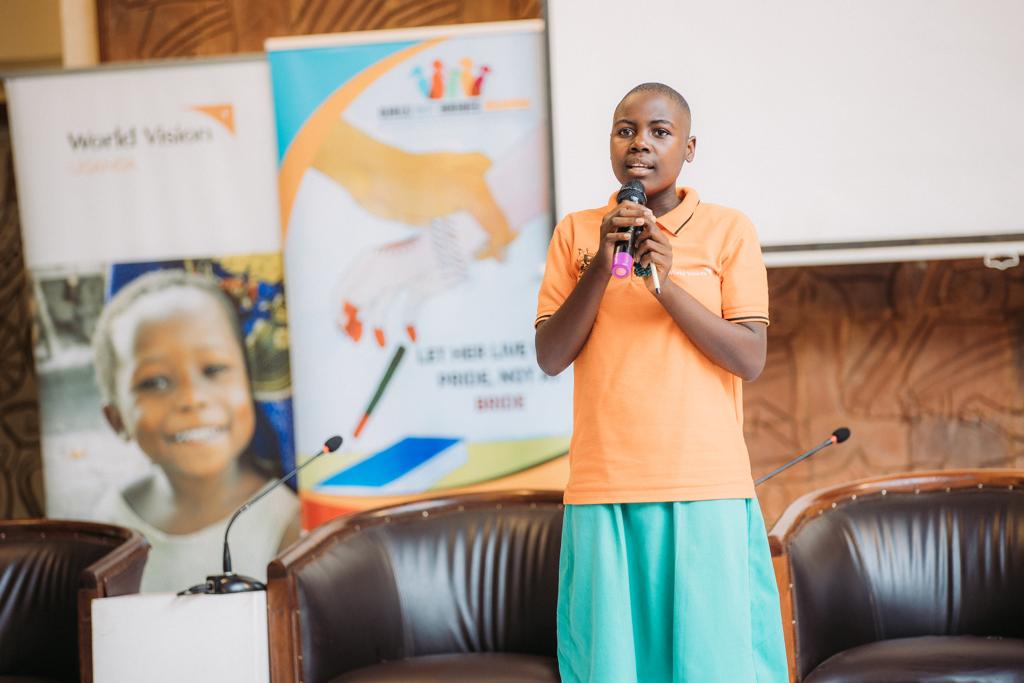
Around 1 in 3 girls and women experience physical and sexual violence in their lifetime. Child marriage is a manifestation of this violence, putting girls and women at a high risk of sexual, physical and psychological violence and related outcomes like poor health, depression throughout their lives.…
Read More
The media is a powerful tool that plays a critical role in driving state accountability; exposing impunity and advocating for change.…
Read More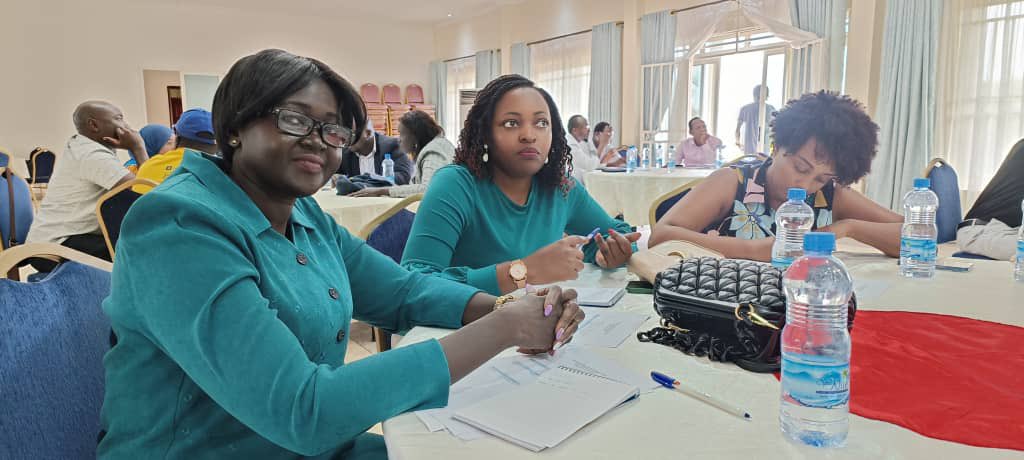
Civil Society serves as a pillar of democratic systems, playing an important role in democracy and good governance for pre-and post-conflict societies. CSOs play a critical role in developing, monitoring human rights situations, implementing strategies that promote peace and security, monitoring imp…
Read More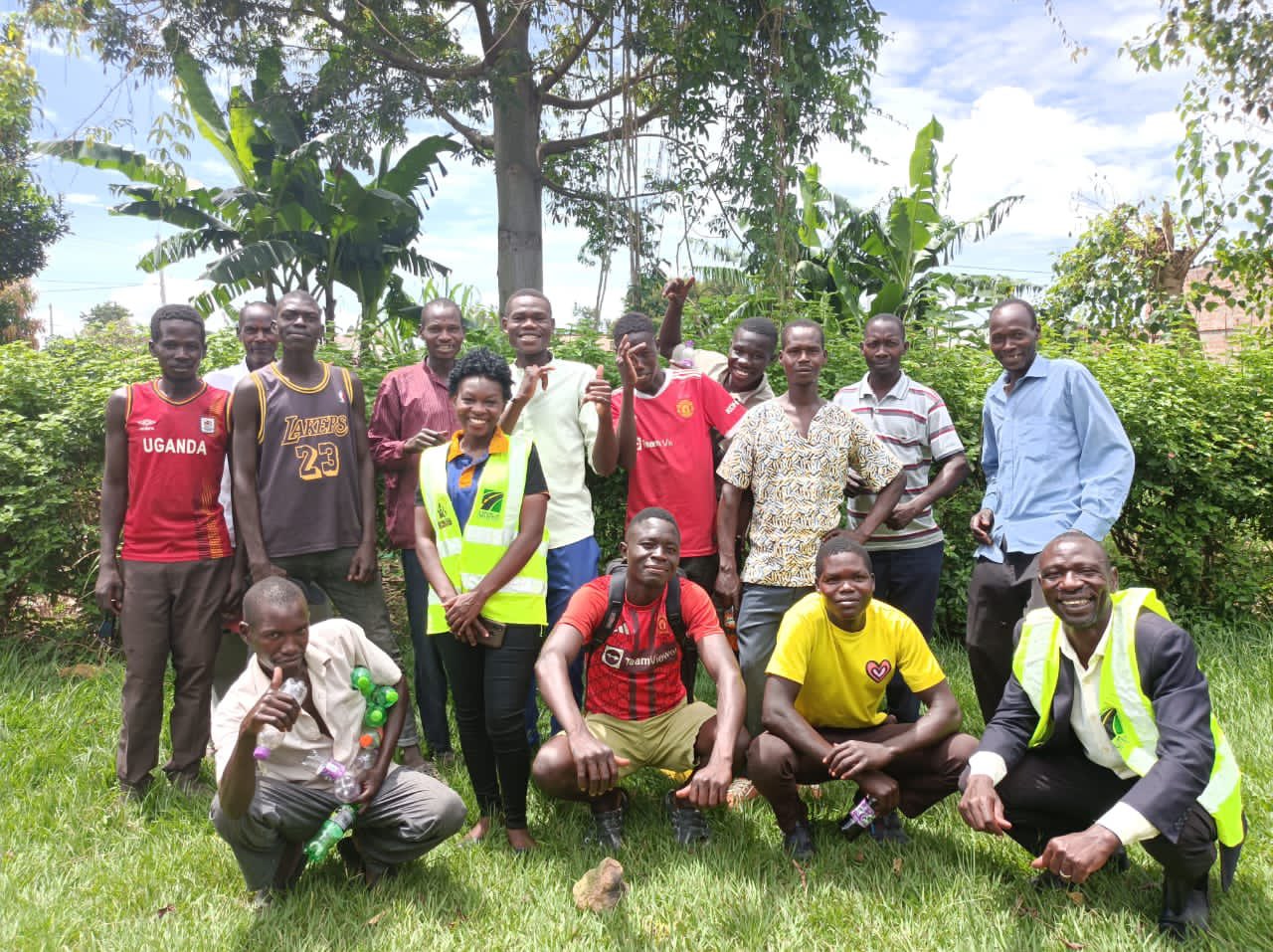
The prevalence, complexity and the social acceptance of Gender Based Violence (GBV) have generated the recognition that the prevention and response to GBV requires broad community participation and particularly the participation of men and boys.…
Read More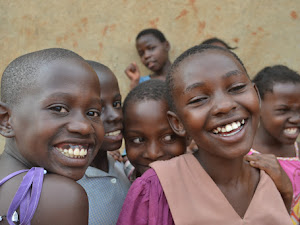
Ending Child Marriage could save Uganda billions of dollars; it could lead to welfare benefits for the country for about $2.4 billion by 2030. By contrast, ending the practice will have a multiplier effect for Uganda since it has the highest rates of child marriage in sub- Saharan Africa.…
Read More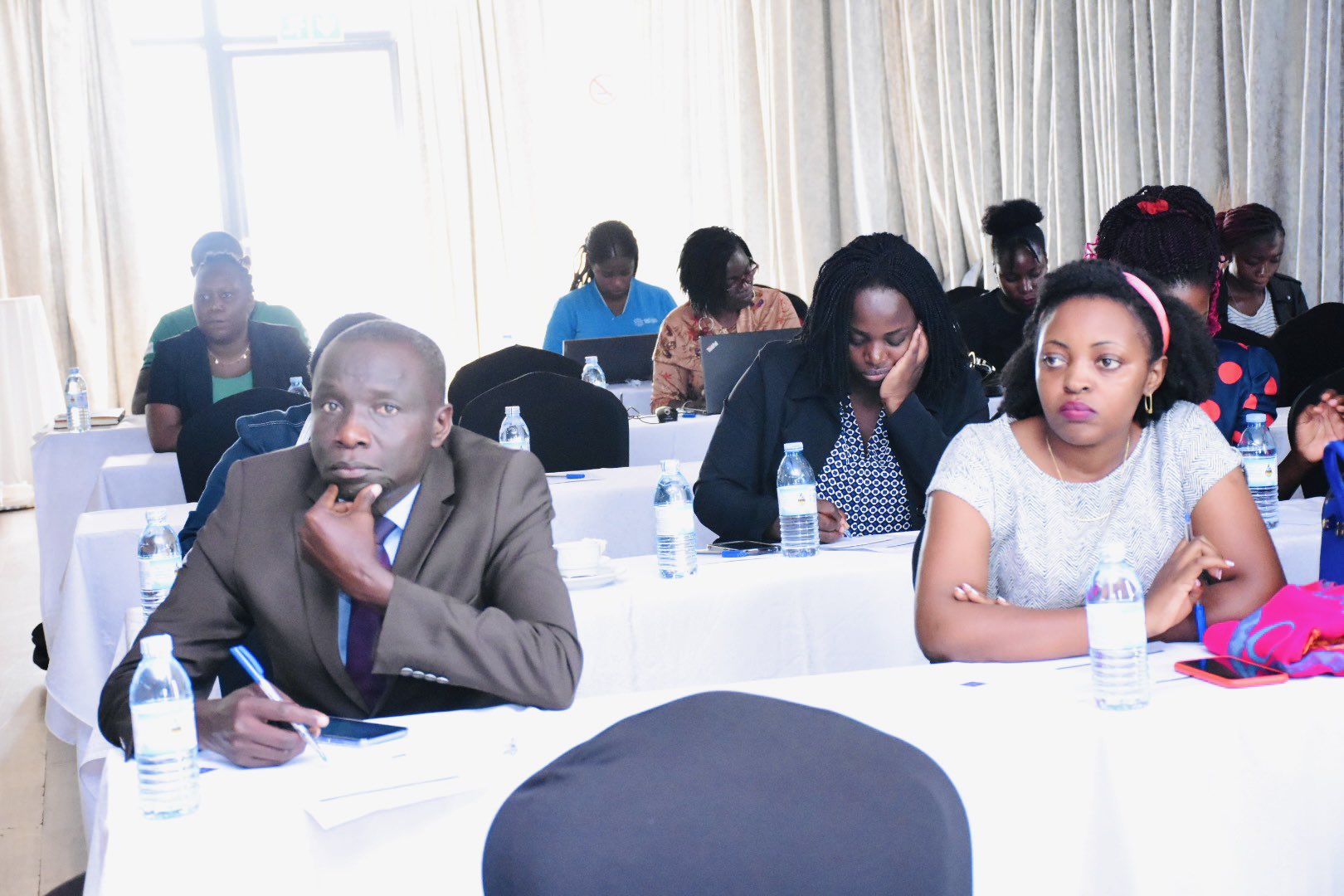
In 2013, Ministers of Health and Education of the East African Community (EAC) and Southern African Development Community (SADC) endorsed the Eastern and Southern Africa (ESA) Inter-Ministerial Commitment, which ended in 2020. The Commitment largely aimed at preventing child marriage, Sexual and Gen…
Read More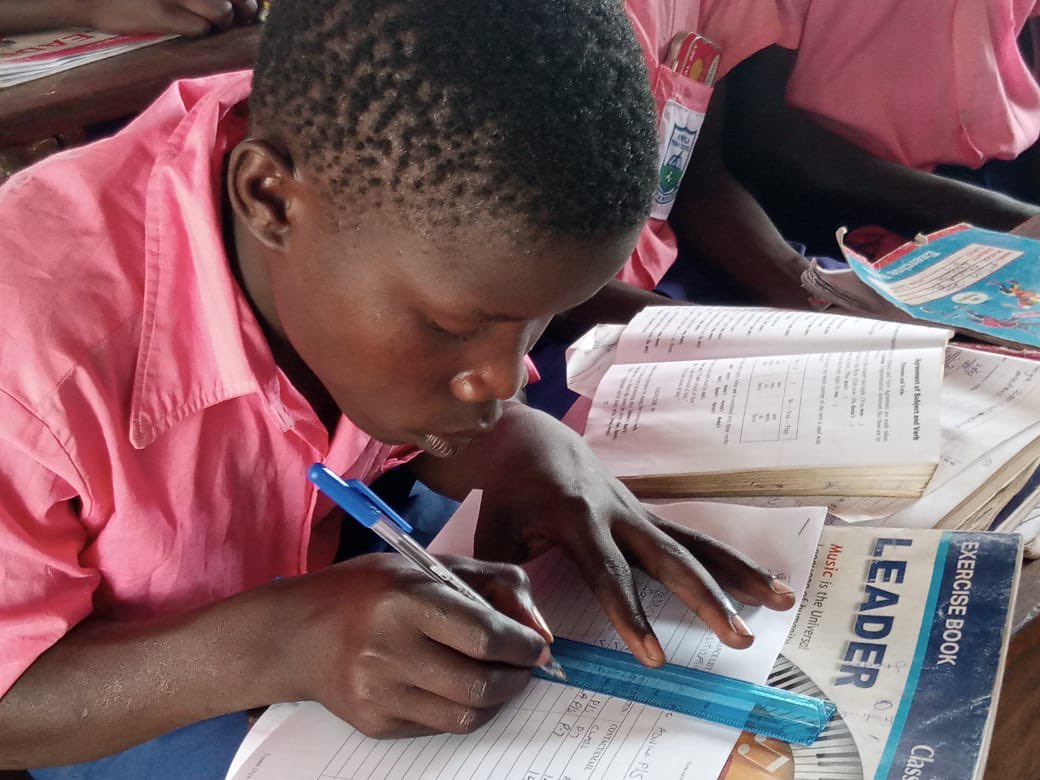
Access to quality education gives girls choices and opportunities in life, allowing them to play an active role in their communities and break the cycle of poverty. Girls who are married are unlikely to be in school. Education, including comprehensive sexuality education, is essential for girls to b…
Read More
Women girls are disadvantaged when it comes to digital adoption, have lower levels of access to and use of digital technology than boys and men, and often are not benefitting from digital technology in the same way as boys, there is also a large gender gap in the number of women and men employed in…
Read More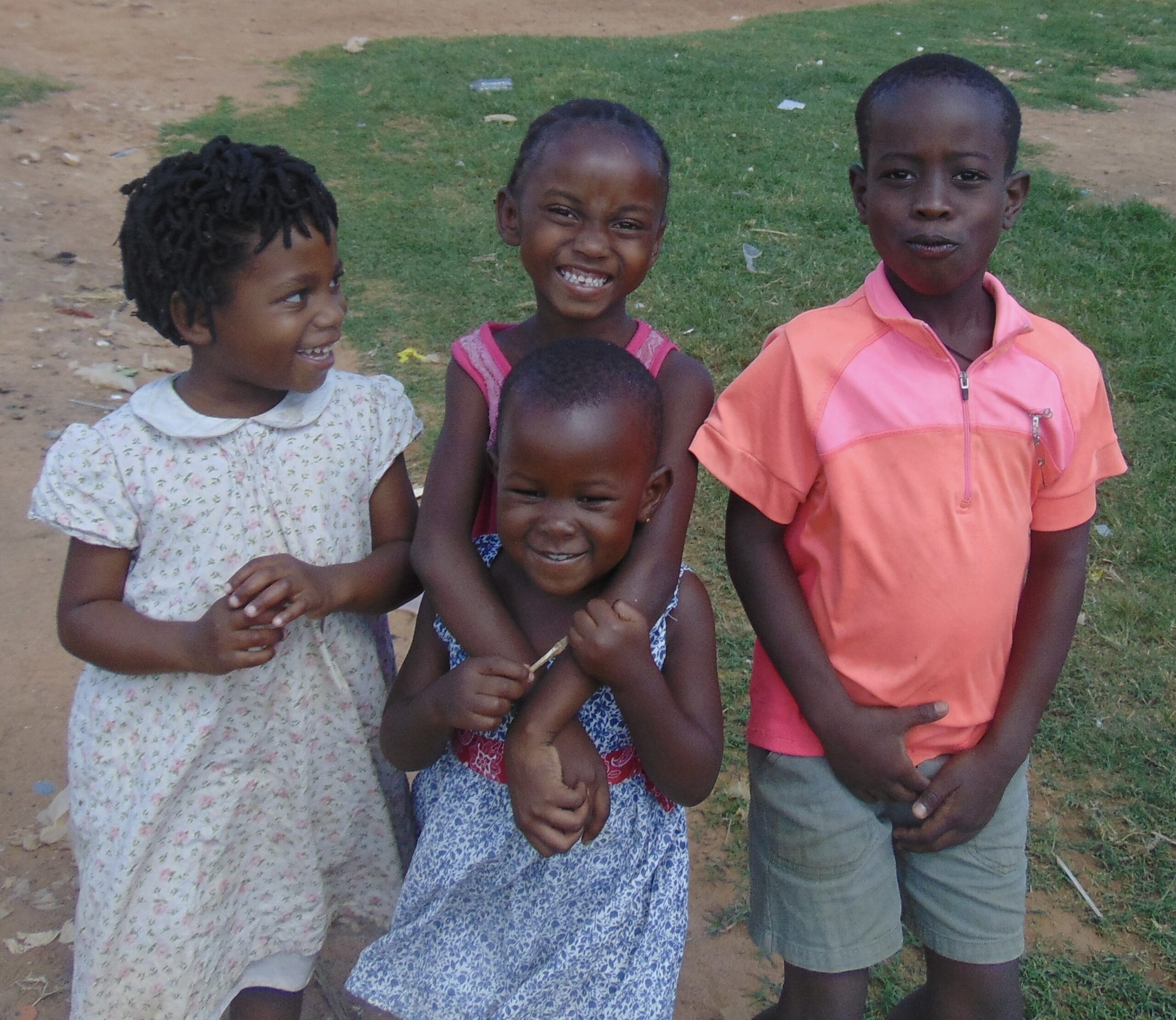
Every child deserves to grow up free from harm. Yet Gender-Based Violence continues, effectively ending their childhoods and risking their futures. Gender-based violence occurs in every part of the country and across all economic and social groups. Sadly, one in three women and girls will experienc…
Read More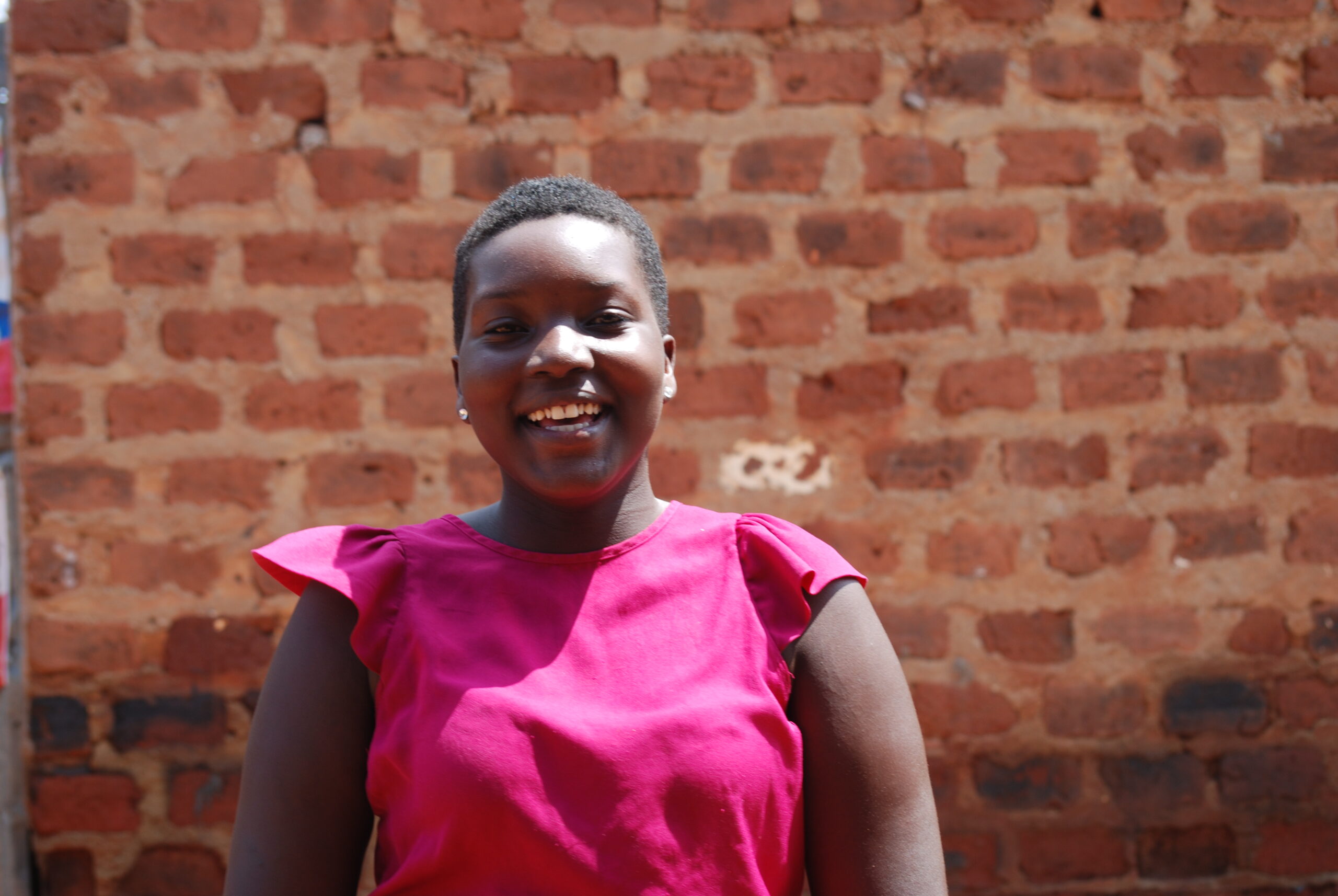
The devastating and compounded impacts of COVID-19, Climate change, Conflict, have created a triple threat for women and children, pushing them further to the margins of society and exposing them to physical and psychological harm.…
Read More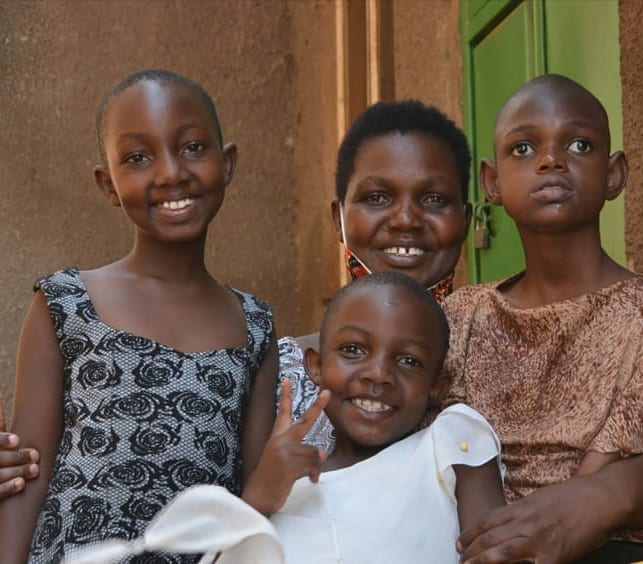
While a home and family can be the primary setting where violence against children occurs, they can also be the most important sources of protection from violence, and of care and support when violence has occurred.…
Read More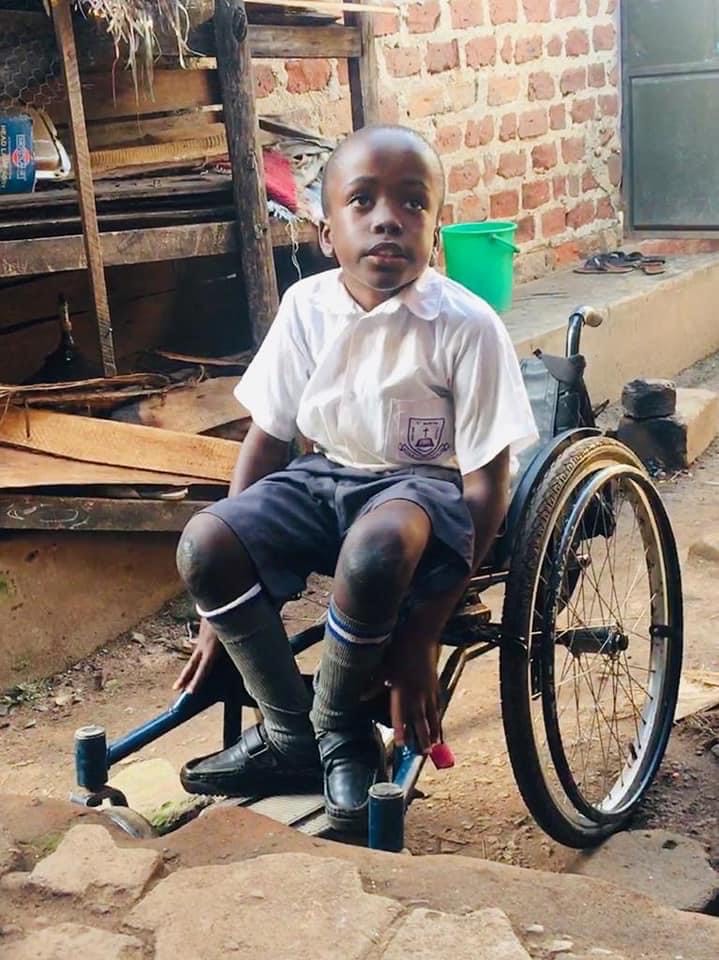
Every child is at risk of Child Sexual Abuse but children with special needs are more vulnerable. Girls with special needs, in particular, are often at greater risk, both within and outside the home, of violence, injury or abuse, neglect or negligent treatment, maltreatment or exploitation.…
Read More